EASY MOTHER’S DAY RECIPES









GIRLS GET DOWN TO BASS TACTICS INTO THE WILD



EASY MOTHER’S DAY RECIPES










GIRLS GET DOWN TO BASS TACTICS INTO THE WILD



The R.D. Morrow, Sr. Generating Station, located near Purvis, achieved commercial operation on March 16 as an advanced-class natural gas-fired plant capable of generating 572 MW of electricity.

The new plant operates on the site of the cooperative’s original 1978 coal facility. In June 2018, the Cooperative Energy Board of Directors announced a five-year plan to convert the plant from coal to natural gas due to improved e ciency and economic factors. As a not-for-profit, member-owned electric utility, responsibility, reliability, and a ordability were deciding factors for the project. Now complete, the plant generates more electricity more economically and provides the operational flexibility necessary to balance the increase in renewable energy sources across the country.
The Morrow Repower Project also set a new standard for employee retention. Whereas many plant conversions result in sta reductions, all Plant Morrow employees were retained throughout the project to assist with demolition, construction, and plant conversion activities, yielding a positive local economic impact and overall project savings.
“Plant Morrow represents forward-thinking energy solutions for our distribution Members at a competitive price,” said Cooperative Energy’s Senior Vice President of Power Generation Mark Smith. “Equally as important, the new Plant Morrow represents years of grit and determination by many Cooperative Energy employees for the benefit of our 11 member systems and those they serve across the state.”
Cooperative Energy employees collectively invested nearly 300,000 work hours in the Morrow Repower Project with a nearly perfect safety record, yielding more than $12 million in project savings.
CoBank, a cooperative bank serving the electric industry, agribusinesses, rural infrastructure providers and Farm Credit associations throughout the United States, has contributed $250,000 in support of NRECA International’s rural electrification projects in developing countries. This is the 12th consecutive year CoBank has donated to NRECA International, totaling $2.5 million in collective contributions.

NRECA International has helped more than 160 million people worldwide, improving their quality of life by providing access to safe, reliable, and a ordable electricity.


This year’s donation will be used to continue the support for electrification projects in Guatemala. For over a decade, electric cooperatives across country have joined NRECA International to bring power to more than 8,000 Guatemalans – significantly brightening their futures.
When the Guatemalan project initially began in 1987, just 45% of the homes in Guatemala had electric service, with only 10% of rural areas receiving service. Today, Guatemala has electricity service for 92% of all households and businesses — however there are scattered housing clusters and small villages in the more remote, mountainous villages throughout Guatemala that still need electricity.
Gene Rodrigues, assistant secretary of energy for electricity, said he shares the National Rural Electric Cooperative Association’s goal of ensuring that the electric grid “remains reliable, resilient and a ordable for all Americans.” The importance of grid reliability was the main message that co-op leaders took to Capitol Hill and federal agencies during April’s NRECA Legislative Conference in Washington, D.C.
“We are all in agreement with every single one of you in this room that reliability is the foundation of everything we want to do,” he said.
Unfortunately, the American people and many of their elected o cials “take it for granted” that the lights will always come on when they flip the switch, Rodrigues said.
“That’s a problem,” he said, urging co-op leaders to “advocate, educate and collaborate” to sound the alarm about the potential risks to reliability.
“If it’s taken for granted, then we won’t have the champions we need to keep electricity reliable and a ordable over time. … Make sure they understand the absolute necessity of investing in a 21st century power grid for the American people.”
DOE o cial: ‘Reliability is the foundation’

Service. Mission. Country. You likely identified immediately (and correctly) that these three words describe our nation’s veterans. They also succinctly describe a core co-op ethos.
While veterans are innately motivated to serve, in a similar vein, electric co-ops are guided by foundational principles that put their community first. Afterall, electric co-ops were founded to bring electricity to rural areas where there was none. In doing so, they powered local economies and helped them to thrive. I believe this close connection to an essential mission is why there are so many veterans in the utility industry and why they are such a great fit for electric co-ops.
Today’s veterans are highly skilled because everyone who joins the military is either trained in a tech career field or exposed to advanced technology during their years of service. Many veterans have skills in advanced disciplines such as engineering, electronics, or mechanics, which are all beneficial for the utility industry. 4-County is proud to employ a number of honored veterans, and we’re especially grateful for their contributions to the co-op and to our community. And we are honored to maintain power lines for our own Columbus Air Force Base.
Veterans are adept at responding to changing conditions and learning and adapting to new technologies, which is essential in our evolving industry. Working for an electric co-op is more than a job. There is a clear mission in the work — to help our consumer-members and the community. When you work so closely with the community, you can’t help but feel a sense of commitment and responsibility to our members. It’s similar to the sense of duty and responsibility that veterans experience in the military. They feel deep, personal responsibility and commitment to their co-op team members and to the members we serve. Veterans are trustworthy, goal oriented, and aim to do right for their co-op and their community.
May is Military Appreciation Month and at 4-County, we are grateful to have veterans within our ranks and we are proud to serve them and their families within our community. But beyond our gratitude, we demonstrate our deep appreciation through our actions and ongoing commitment to veterans and their families.
I hope you’ll join me in recognizing the sacrifices veterans have made to our great country — and the many contributions they continue to make to our wonderful community. Veterans, we salute you!
Navigating through COVID-19 uncharted waters, dealing with an uncertain supply chain, balancing a budget with the rising cost of doing business and starting a new broadband company from scratch. The 4-County Electric Power Association Board of Directors has done it all, and then some, in recent years.
How do you make di cult decisions in a di cult and busy environment? Research, relying on each other and a lot of prayer, according to 4-County Board members.

“The 4-County Board of Directors has been really busy the last several years, and we’ve gotten a lot accomplished. It’s important for us, as a board and as individuals, to make sure we’re doing everything we can to be good stewards of our members’ resources and make informed decisions. Everything falls in place with a lot of hard work, supporting each other and prayer,” said 4-County Board President Mike Banks.
The Board is committed to being a leader in co-op management and technology while always focusing on members and their satisfaction. “Our continuing educational programs for Directors and employees has played an important role in workplace safety, reliability, and rates. Because of this Board’s commitment and leadership, 4-County has thrived and grown without a residential rate increase since 2018,” Banks added.
The co-op board and its employees are managing this fastpaced environment by implementing a number of tried-andtrue successful strategies, including:

• Staying informed
• Planning ahead
• Understanding the expectations
• Communication
• Organization
• Meeting (and exceeding goals)
by Brian Clark CEO/General Manager4-County CEO Brian Clark said the co-op board has shown outstanding leadership in an ever-changing global and industrial landscape. “Our Board of Directors has worked extremely hard, shown outstanding initiative and kept our employees’ and members’ best interests at heart to make a brighter future for 4-County. They’ve made some challenging decisions in the last several years that will reap benefits for the co-op in years to come,” Clark added.
4-County serves over 50,000 members in parts of nine counties.

“Improving the quality of life for all those we touch.”
❏ JUNE 1, 2023
❏ New Location! Communiversity
7003 S. Frontage Road in Columbus
❏ Registration & Health Fair • 9 a.m.
❏ Lunch • 10:15 a.m.
❏ Business Meeting • Noon
❏ Door Prizes from 9 a.m. to 1 p.m.
(Grand Prize is a Retired 4-County Fleet Truck!)





Mike Banks and Bill Bell are nominated for three-year terms on 4-County Electric Power Association’s board of directors.
Banks (District 4, Noxubee County) and Bell (District 7, At-Large), both of Macon, – and both current board members — were placed in nomination by the association’s nominating committee at its March 9 meeting.
In accordance with the Association’s bylaws, the candidates’ names were placed in nomination for election to three-year terms, beginning June 1 at the cooperative’s annual membership meeting.
Kennedy Neal of Starkville has qualified to run for the District 7, At-Large position via petition.


District 4, Noxubee County
(received Nominating Committee nomination)
• FASTnet Board of Directors
• Macon resident
• Owner, Trailboss Trailers, INC., Wagon Wheel restaurant
• Veteran, U.S. Army National Guard
• Attended East Mississippi Community College and Mississippi State University
District 7, At-Large
(received Nominating Committee nomination)
• FASTnet Board of Directors


• Noxubee County resident
• Registered pharmacist
• Owner/Manager of City Drug Store in Macon
District 7, At-Large
(Nomination by petition)
• Starkville resident
• Director of Environmental Services, Oktibbeha County Regional Medical Center
• Graduate, Moor High School and Hinds Community College
• Director, George M. Bryan Airport; Trustee, Starkville/ Oktibbeha County Public Library System; Member, Greater Starkville Development Partnership.
• Noxubee County Businessman of the Year 1987, 1998

• Commercial Dispatch Hometown Hero, 2022
• Member, First United Methodist Church, Macon
• Earned all three levels of cooperative director certification
• Wife, Terri, four daughters, six grandchildren
• Graduate, Central Academy and University of Mississippi
• Member/Elder, Macon Presbyterian Church
• Certified Credentialed Cooperative Director
• Wife, Betty, three children and six grandchildren
• Past member, Starkville Race Relations Committee; past Director, Helping Hands.

• Investigative researcher, Patton Law Firm; Certified group exercise instructor, NESTA.

• Deacon, New Beginnings Fellowship Church
• Wife, Elzena, three sons.























4-County 2023 Cooperative Leader delegates Averie Gundy, Evee Stevens, Arianna Brown, and Mackenzie Murphy participated in the Electric Cooperatives of Mississippi’s 36th Annual Cooperative Leaders Workshop March 1-3 in downtown Jackson. All four earned leadership certificates while Gundy also received one of a handful of leadership awards given at the conference.
Each year, about 1,000 of Mississippi’s brightest high school juniors vie for the opportunity to attend the three-day workshop through their local cooperatives. This year, 82 students participated in the leadership activities.

Leadership through team building is the theme of the workshop. The students heard speeches from a variety of state leaders, including Gov. Tate Reeves and Secretary of State Michael Watson. The group also had a photo session and breakfast with their state legislators, including Sens. Bart Williams, Chuck Younger and Rod Hickman, and Reps. Joey Hood and Andy Boyd.
Students toured the State Capitol and participated in a wide range of leadership development activities. In June, the 4-County leadership quartet will travel with the statewide youth group to Washington, D.C. The six-day trip will include visits to all of the popular monuments and memorials.


Paula Smith has joined the 4-County Electric Power Association team as a Consumer Services Representative. Smith will be based at the Starkville o ce. She and her son, Howard, 5, live in Macon. Prior to 4-County, Paula worked for nearly three years as a Call Center Agent for Cadence Bank in Starkville. She attends Devry University and is studying Business Administration. In her spare time, she enjoys cooking and reading.
Welcome to the 4-County team, Paula!








O cials with FASTnet, 4-County’s broadband subsidiary, have participated in information sessions recently for co-op members in the Noxubee County and Sturgis areas.

Interested attendees gathered at the Noxubee County Civic Center in Macon on March 13 and at the Sturgis Fire Department April 13 to learn more about FASTnet and the services the 4-County subsidiary is providing in their areas.
FASTnet o cials answered questions, distributed information, and signed up 4-County members for the broadband FASTnet service.

Over 11,000 4-County members are receiving FASTnet broadband service! If we haven’t made it to your area yet, don’t worry. We’ll be there soon! Thank you for your support!
For more information on FASTnet, call 1-800-431-1544.







 Paula Smith
Paula Smith

A tradition of dependable, hometown service since 1937
Electric cooperatives are proud to serve small businesses that are essential to our local communities. As costs for pretty much everything continue to rise, small business owners are feeling strained. Luckily, there are steps Mississippi’s small business owners can take to conserve energy — and save money.
Many small businesses are in commercial buildings smaller than 50,000 square feet. These buildings use 44% of the energy consumed by commercial buildings in the United States. According to the EPA’s ENERGY STAR® program, small businesses in the U.S. collectively spend a staggering $60 billion on annual
Many small businesses, like o ces and retail stores, depend greatly on lighting, which can be a major expense. There are two ways to increase the e ciency of your business’s lighting system: install energy e cient equipment (bulbs and/or fixtures) and change how you use lighting.
New LED bulbs use less energy and last much longer. LEDs come in a variety of options and prices, making them great replacements for older, ine cient bulbs.
Encourage employees to turn o lights when they’re not being used. You can also install light switches with sensors so lights automatically turn o when no one is in the room.
Turning o o ce equipment and appliances can help save energy and money. Computer monitors can add up to $30 to an o ce’s energy bill if left on during evenings and weekends.
Restaurants typically use up to 10 times more energy per square foot than other commercial buildings. To save money, it is important to have energy e cient food service equipment.
Additionally, kitchens in many other kinds of small businesses use microwaves, co ee makers, and refrigerators, which should be considered when reviewing overall energy use.
Heating and cooling account for a large portion of a small business’s energy bills.
Tracking energy use and maintaining the heating and cooling system can help small business owners save on energy bills. The system should be inspected annually, and filters should be replaced regularly. If the system needs replacing, consider alternative options like a heat pump with a seasonal energy e ciency ratio (SEER) of 13 or higher. Your local electric co-op can o er advice on e cient heating and cooling equipment.
energy costs. Additionally, a survey conducted by the National Federation of Independent Business found that energy costs are a top-three expense for more than a third of the nation’s small businesses.
Small businesses can reduce their energy costs by taking advantage of competitive rates, making upgrades to increase e ciency and making simple changes to how they do business. This can have a direct e ect on a business’s bottom line and make it more competitive in the current market.
Just like our homes, small businesses have windows, walls, a roof, and insulation as part of their building envelope. Air leaks can lead to higher bills.
Leaks typically are found around windows, doors, walls, and the roof. Seal these areas for additional energy savings.
E cient use of energy and water go hand in hand. In most cases, gas or electricity is used to heat water, which costs money. The more heated water your business uses, the more you can save by determining how to use water most e ciently. Lowering the water temperature between 110 and 120 degrees is an easy way to save on water heating.
Many businesses can recognize fuel savings and lower the total cost of fleet ownership and transportation networks by switching to electric vehicles (EVs).
EVs have lower maintenance costs because they are more reliable than internal combustion engine (ICE) vehicles. This is because EVs have fewer mechanical parts that can break, and they often provide better data to allow for more proactive maintenance. Depending on your business’s transportation needs, EVs may be able to provide better energy savings for the long-term.
In conclusion, small businesses can take simple steps to better control how much energy they use and how they use it. Not sure where to start? Ask your electric co-op if they o er energy audits, which can identify areas to save the most energy.
Here are a few areas small business owners can focus on saving energy and money.
Over 300 people attended the 86th Annual Meeting of the Membership of Central Electric Power Association on March 21 at the coliseum in Carthage.

The crowd was entertained by Bros. 4 Quartet, a southern gospel quartet based out of Rankin County. Members enjoyed the old convention-style singing.

General Manager Brian Long opened the meeting followed by the invocation given by Phillip Crosby, a member of the board of directors. Mayor Laurie Henderson of Carthage welcomed the crowd and complimented Manager Long and the board of directors for the wonderful job they do for the community.
John Malone, Tennessee Valley Authority (TVA) Director of Customer Relations, provided TVA updates to the members. TVA values their partnership with Central Electric Power Association and the hard work that has been accomplished through the years.
Lydia Walters, Electric Cooperatives of MS (ECM) Vice President of Communications, was a guest at the meeting.
Manager Long reported that by the end of 2022, the association had 38,268 members in central Mississippi and 4,347 miles of underground and overhead distribution and transmission lines. Long also praised his sta for working hard, being safe, and keeping the lights on.
To conclude the meeting, a ra e took place. Dozens of prizes, including a smoker, were given to away to lucky members.
$1,500 ELECTRICITY CREDIT





The special prize winners were $500 ELECTRICITY CREDIT
Salem Baptist Church Leake county
Helen Boykin
Newton county
Lewis Trest
Leake county
Jimmy Jordan
Leake county





DON’T place flammable items, like potholders, napkins or dish towels near the stove while cooking.
DO ensure you’re using the correct wattage in all light fixtures.
DO keep electrical devices away from water to prevent electric shock.
DON’T overload electrical outlets with more devices than the circuit can handle.









farmers a great planting season

healthy crop.
with a large and



What does farming mean to you? It may be just a simple job to some, but to others, it’s a passionate lifestyle. However, farming in and of itself is not the goal — providing food for you and your family is the ultimate goal.
The farmer is more than a person just working the fields. Sadly, a “good, decent job” has evolved into something that looks di erent than manual labor these days. Farming looks easy on television, or maybe when you’re a thousand miles away from a corn field, cotton field, or bean field. The truth is that maintaining fields is hard work. Still, the work provides unlimited possibilities and endless rewards.
It was once said, to be successful at producing money from the mud, you have to fall deeply in love with farming. Every farmer and farm have a story to share, whether it be
sad, hilarious, heart wrenching, amazing, or worthy of a hallelujah shout!
Oh, did I mention to be a farmer you have to be a student? Farmers wear many hats daily and have acquired scores of degrees. There are chemists, meteorologists, agriculturists, hydrologists, and irrigation specialists. There are also midwives and animal nutritionists, profound dog whisperers, and the horse high, pig tight, and bull strong fencers. Just when a farmer thinks they’re having a peaceful day, they are forced to become an old-fashioned trial and error problem solver, dreading the call to their energy provider because the sprayer got caught up in the electrical wiring and happened to pull down a power pole. Imagine the daily stress farmers experience. When you come from a small town where a tra c jam is six cars behind a tractor, nothing really surprises you.
If you ate today and have clothes, #THANKAFARMER.

 by Jennah Denney
by Jennah Denney
Electric cooperatives are proud to serve small businesses that are essential to our local communities. As costs for pretty much everything continue to rise, small business owners are feeling strained. Luckily, there are steps Mississippi’s small business owners can take to conserve energy—and save money.
Many small businesses are in commercial buildings smaller than 50,000 square feet. These buildings use 44% of the energy consumed by commercial buildings in the United States. According to the EPA’s ENERGY STAR® program, small businesses in the







U.S. collectively spend a staggering $60 billion on annual energy costs. Additionally, a survey conducted by the National Federation of Independent Business found that energy costs are a top-three expense for more than a third of the nation’s small businesses.
Small businesses can reduce their energy costs by taking advantage of competitive rates, making upgrades to increase e ciency and making simple changes to how they do business. This can have a direct e ect on a business’s bottom line and make it more competitive in the current market.
Many small businesses, like o ces and retail stores, depend greatly on lighting, which can be a major expense. There are two ways to increase the e ciency of your business’s lighting system: install energy e cient equipment (bulbs and/or fixtures) and change how you use lighting.
New LED bulbs use less energy and last much longer. LEDs come in a variety of options and prices, making them great replacements for older, ine cient bulbs.

Encourage employees to turn o lights when they’re not being used. You can also install light switches with sensors so lights automatically turn o when no one is in the room.







Turning o o ce equipment and appliances can help save energy and money. Computer monitors can add up to $30 to an o ce’s energy bill if left on during evenings and weekends.
Restaurants typically use up to 10 times more energy per square foot than other commercial buildings. To save money, it is important to have energy e cient food service equipment.
Additionally, kitchens in many other kinds of small businesses use microwaves, co ee makers, and refrigerators, which should be considered when reviewing overall energy use.


Here are a few areas small business owners can focus on saving energy and money.

Heating and cooling account for a large portion of a small business’s energy bills.

Tracking energy use and maintaining the heating and cooling system can help small business owners save on energy bills. The system should be inspected annually, and filters should be replaced regularly. If the system needs replacing, consider alternative options like a heat pump with a seasonal energy e ciency ratio (SEER) of 13 or higher. Your local electric co-op can o er advice on e cient heating and cooling equipment.
E cient use of energy and water go hand in hand. In most cases, gas or electricity is used to heat water, which costs money. The more heated water your business uses, the more you can save by determining how to use water most e ciently. Lowering the water temperature between 110 and 120 degrees is an easy way to save on water heating.

Just like our homes, small businesses have windows, walls, a roof, and insulation as part of their building envelope. Air leaks can lead to higher bills.
Leaks typically are found around windows, doors, walls, and the roof. Seal these areas for additional energy savings.

Many businesses can recognize fuel savings and lower the total cost of fleet ownership and transportation networks by switching to electric vehicles (EVs).
EVs have lower maintenance costs because they are more reliable than internal combustion engine (ICE) vehicles. This is because EVs have fewer mechanical parts that can break, and they often provide better data to allow for more proactive maintenance. Depending on your business’s transportation needs, EVs may be able to provide better energy savings for the long-term.
In conclusion, small businesses can take simple steps to better control how much energy they use and how they use it. Not sure where to start? Ask your electric co-op if they o er energy audits, which can identify areas to save the most energy.

DON’T place flammable items, like potholders, napkins or dish towels near the stove while cooking.
DO ensure you’re using the correct wattage in all light fixtures.
DO keep electrical devices away from water to prevent electric shock.
DON’T overload electrical outlets with more devices than the circuit can handle.




















our members have the power Communicators: April Lollar, Merilee Sands & Sarah Belk









Electric cooperative employees have a lot of responsibilities. We power our communities; we work to make our economy and quality of life better; we have a financial responsibility to the people we serve, who are also owners of our company. The most important responsibility we have; however, is to make sure each and every employee safely makes it home at the end of the day. We also want our members to know how important electrical safety is to all of you, not just those of us who work in the industry every day. May is Electrical Safety Month, and we encourage you to practice electrical safety in your home all year. We’ve got plenty of resources for you and your family to keep you safe, whether it’s after a storm when you
use a generator, when you’re working on home improvement projects or while you’re hunting or enjoying a day on the water. Please visit www.beawareeverywhere.com, so you can learn about how to stay safe around electricity!

 by Ron Barnes
President and CEO
by Ron Barnes
President and CEO
Coast Electric’s business o ces will be closed Monday, May 29, for the Memorial Day holiday. We hope everyone takes time over the holiday weekend to remember those who made the ultimate sacrifice for our country. Dispatchers will be on duty and crews will be on call throughout the holiday weekend. If you need to report an outage, you can text 352667 if you have a mobile number associated with your account, or you can use our CE on the Go app. You can also give us a call at 877-769-2372. Have a safe and happy holiday weekend.
















On May 22, Coast Electric’s web address will be changing, and our website will be getting a new, fresh design. Be sure to keep an eye out for this change and update your bookmarks. Our member services email address will also be changing to call@coastelectric.coop.

Our new website will be user-friendly and easy to navigate and will continue to be a source for everything you need to pay your bill, update your account, report outages, reduce your use and more. To ensure a smooth transition, members who visit our old web address will be redirected to the new address for a while. Since this change also a ects our member portal, you may need to re-enter your login credentials when you access your account for the first time through the new address. New website address: www.coastelectric.coop.





BE SURE TO CHECK OUT COASTELECTRIC.COOP ON MAY 22



Coast Electric is celebrating decades of service in our community.

We will host a Member Appreciation Day in our o ces on Monday, May 22, to commemorate the 85th anniversary of the day we first energized lines for Coast Electric members. We hope you will join us for treats and giveaways as we thank you, our members, honor our past and celebrate the future of Coast Electric in our community.
We are connecting over 14,000 homes and businesses in our community! We are proud to serve our friends and neighbors and are connecting more people every day. Visit www.coastconnect. com to learn more about our world-class speeds and local service.


Coast Electric wants you to reduce your energy use and see savings on your energy costs. Each month, you will have an opportunity to register to win a prize that will help you reduce the energy consumption in your home. Visit www.coastepa. com and fill out our entry form. It only takes a few seconds, and you could win a prize that helps you save!
Congratulations to Carol Beenblossom, the winner of our March Reduce Your Use prize!


Cooperatives like Coast Electric lend a helping hand when other co-ops and their members need help. Usually, that means loading up wire, tools and hitting the road to help restore electrical service after storms. After deadly tornadoes devastated Rolling Fork earlier this spring, Coast Electric employees decided to lend a helping hand by taking much-needed supplies to those a ected by the storm and by cooking hot meals for the community. Coast Electric employees donated over $4,000 worth of supplies for tornado victims in Rolling Fork. Showing concern for our community and helping other cooperatives are important values for co-ops like Coast Electric. We are proud of our employees who generously donated their funds, time and talents to help fellow Mississippians.
Charitable organizations that serve Hancock, Harrison or Pearl River counties could be eligible for a grant of up to $10,000!
izations that serve Hancock, arl River counties could be grant of up to $10,000!
ration Round Up has given $1 million in grants thanks to our members We thank you our local community and we are that grant applications or the month of February
Since 2019, Operation Round Up has given back more than $1 million in grants thanks to the generosity of our members We thank you for supporting your local community and we are excited to share that grant applications are available for the month of February.
In November 2022, the Coast Electric Community Trust Committee awarded an Operation Round Up grant to Mississippi Coast Crime Stoppers (MCCS). The grant funded a billboard program that addresses drug overdose and addiction, and the subsequent rise in violent crimes in our communities. Billboards are now in place in Pearl River, Hancock and Harrison and counties in hopes of saving lives and creating a safer place for everyone. The objective of these billboards is to create awareness of the support and services available to those in need. Crime Stoppers Coordinator Lori Massey said that while we often hear about statistics when it comes to drug deaths, billboards featuring members of the community humanize the story. MCCS, a non-profit organization, encourages members of the community to assist local law enforcement agencies in the fight against crime by overcoming the key elements that inhibit community involvement - fear and apathy.
You and your loved ones can benefit from MCCS services by sharing information that is vital to law enforcement agencies fighting crime. To submit tips, you can call 877-797-5998, visit www.mscoastcrimestoppers.com or use the P3 Tips app. Callers can remain anonymous and are eligible to receive a cash reward if the information given leads to a felony arrest or grand jury indictment of a felony o ender.


At Coast Electric, safety is our top priority. May is Electrical Safety Month. We want to encourage you and your family to follow these simple electrical safety tips to stay safe all year.
• Never put fingers or any objects in electrical outlets. Cover outlets to keep children safe.




• Old or frayed extension cords can cause a fire. Throw them away!

• Keep electrical appliances away from water to prevent electrocution.









• Turn o appliances before unplugging them. Pull the plug itself — not the cord — when unplugging appliances.



• Never tamper with your electrical meter. Not only is it unsafe, it’s also illegal!
• Don’t touch anything that is touching a power line, such as a fence, a car or a piece of machinery.









• Turn o all plugged-in electronics during storms with lightning. Avoid contact with plumbing or water, including bathing or doing laundry.
• Use extension cords only temporarily, and never use them for space heaters or air conditioners.
• Stay away from substations and power lines and keep children away.
• Call 811 before you dig to locate underground lines.
Homeowners looking at home improvement projects have lots of decisions to make, not the least of which is whether to hire the job out or do it themselves. With pros and cons on both sides, the choice is based upon experience, comfort level, and budget.
“What the decision between DIY or a professional ultimately comes down to is an individuals’ comfort level and ultimately what they want to accomplish,” Andrew Brindley of HE Homes in Indianapolis, said. He tells people looking to tackle a project on their own to plan on making a mistake at least once if they’ve never done that particular job before.
“It comes down to the person,” explained Carl Kuchar of Woodchukar Carpentry of Payette, Idaho. “There are some jobs that are simple for people who have done it before, but are not intuitive to someone who has only watched online videos.”

Brindley suggests novice DIYers tackle jobs where appreciation and lessons can be garnered easily online and ones where mistakes may only be cosmetic. “With some projects, it is very easy to look up some tutorials, read some articles and know what you are doing,” he suggested. “But when it comes to actual mechanical trades: structural plumbing, electrical and things like that, those are components of a home that if they are not done correctly, can either create a safety issue or cause a whole bunch of damage.”

Kuchar agreed. “I understand that someone may not be able to a ord a contractor, but they definitely need to do their homework and make sure they understand how to do it,” he said.
Brindley gave the example of a plumbing leak. “If you accidentally cut the wrong line, you could have up to 5,000 gallons of water every minute flowing through your home.”

“While it may cost a little bit more to use a professional rather than making it a DIY project, you have to look at the cost of the whole project,” he added.




Another factor to consider is the necessary equipment. “If a homeowner doesn’t have a lot of tools — or the right tools — for the job, hiring a contractor is probably actually going to be cheaper because I’m going to show up with $40,000 worth of tools, including ones designed specifically to do what they are wanting to do,” Kuchar said, adding that using the wrong tools or even unfamiliar tools may end up costing both time and money.
On the other hand, experts say there are a lot of things homeowners can do themselves: painting, changing faucets, and simple repair, but they say to take your time. The old adage “measure twice to cut once” still holds true.


If, on the other hand, you do choose to hire the job out, it is a good idea to check references and get referrals. “Honestly, I spend a lot of time fixing other contractors’ work,” Kuchar added.













What the decision between DIY or a professional ultimately comes down to is an individuals’ comfort level and ultimately what they want to accomplish

 by Jennah Denney
by Jennah Denney
Electric cooperatives are proud to serve small businesses that are essential to our local communities. As costs for pretty much everything continue to rise, small business owners are feeling strained. Luckily, there are steps Mississippi’s small business owners can take to conserve energy—and save money.
Many small businesses are in commercial buildings smaller than 50,000 square feet. These buildings use 44% of the energy consumed by commercial buildings in the United States. According to the EPA’s ENERGY STAR® program, small businesses in the







U.S. collectively spend a staggering $60 billion on annual energy costs. Additionally, a survey conducted by the National Federation of Independent Business found that energy costs are a top-three expense for more than a third of the nation’s small businesses.
Small businesses can reduce their energy costs by taking advantage of competitive rates, making upgrades to increase e ciency and making simple changes to how they do business. This can have a direct e ect on a business’s bottom line and make it more competitive in the current market.
Many small businesses, like o ces and retail stores, depend greatly on lighting, which can be a major expense. There are two ways to increase the e ciency of your business’s lighting system: install energy e cient equipment (bulbs and/or fixtures) and change how you use lighting.
New LED bulbs use less energy and last much longer. LEDs come in a variety of options and prices, making them great replacements for older, ine cient bulbs.

Encourage employees to turn o lights when they’re not being used. You can also install light switches with sensors so lights automatically turn o when no one is in the room.






Turning o o ce equipment and appliances can help save energy and money. Computer monitors can add up to $30 to an o ce’s energy bill if left on during evenings and weekends.
Restaurants typically use up to 10 times more energy per square foot than other commercial buildings. To save money, it is important to have energy e cient food service equipment.
Additionally, kitchens in many other kinds of small businesses use microwaves, co ee makers, and refrigerators, which should be considered when reviewing overall energy use.



Here are a few areas small business owners can focus on saving energy and money.


Heating and cooling account for a large portion of a small business’s energy bills.

Tracking energy use and maintaining the heating and cooling system can help small business owners save on energy bills. The system should be inspected annually, and filters should be replaced regularly. If the system needs replacing, consider alternative options like a heat pump with a seasonal energy e ciency ratio (SEER) of 13 or higher. Your local electric co-op can o er advice on e cient heating and cooling equipment.
E cient use of energy and water go hand in hand. In most cases, gas or electricity is used to heat water, which costs money. The more heated water your business uses, the more you can save by determining how to use water most e ciently. Lowering the water temperature between 110 and 120 degrees is an easy way to save on water heating.

Just like our homes, small businesses have windows, walls, a roof, and insulation as part of their building envelope. Air leaks can lead to higher bills.
Leaks typically are found around windows, doors, walls, and the roof. Seal these areas for additional energy savings.

Many businesses can recognize fuel savings and lower the total cost of fleet ownership and transportation networks by switching to electric vehicles (EVs).
EVs have lower maintenance costs because they are more reliable than internal combustion engine (ICE) vehicles. This is because EVs have fewer mechanical parts that can break, and they often provide better data to allow for more proactive maintenance. Depending on your business’s transportation needs, EVs may be able to provide better energy savings for the long-term.
In conclusion, small businesses can take simple steps to better control how much energy they use and how they use it. Not sure where to start? Ask your electric co-op if they o er energy audits, which can identify areas to save the most energy.

DON’T place flammable items, like potholders, napkins or dish towels near the stove while cooking.
DO ensure you’re using the correct wattage in all light fixtures.
DO keep electrical devices away from water to prevent electric shock.
DON’T overload electrical outlets with more devices than the circuit can handle.














Spring and summer are opportune times for home upgrades and DIY projects. If you’re planning to make improvements to your home, you may want to consider upgrades that promote better energy e ciency.
Technology has come a long way and can enable our members to save money each year on their power bills. Here are a few smart projects that can help you save energy and money, and increase the comfort of your home. Best of all, some of these upgrades pair perfectly with DE Fastlink high-speed internet.

Installing a smart thermostat is one of the simplest ways to manage home energy use and keep summer bills in check. Smart thermostats are easy to install and allow you to control your heating and cooling system from your phone. You can purchase an ENERGY STAR®-certified smart thermostat for as low as $100, saving you 8% on annual heating and cooling costs, about $50 per year. This upgrade will quickly pay for itself, and you’ll gain insight into better ways to heat and cool your home.
Speaking of smart, additional devices like smart LED bulbs also o er convenient control and help boost energy savings at home. With smart lighting, you can schedule when and how your lights should be turned on or o . Smart lights come in a variety of shapes, colors, and brightness levels, and you can purchase bulbs for indoor or outdoor use. You can also schedule smart outdoor lights to illuminate your home at night and when you’re out of town for better security.
A tried-and-true method for making your home more energy e cient is sealing air leaks around your home. Applying new (or replacing old) weather stripping around doors and windows can instantly make your home more comfortable and reduce energy waste. Applying caulk to fill gaps can also improve the seal of your home. Caulk can be applied to various areas, including windows, doors, bathtubs, and sinks.
If your home feels too warm during summer, and too chilly during winter, even after you’ve sealed it with weather stripping and caulk, your home may need additional insulation. Insulation is considered a more expensive e ciency upgrade; however, if your home is under-insulated, additional insulation can greatly impact energy use and costs. The cost of new insulation depends on a variety of factors, like materials, the size of the home, and whether you use a contractor. Typically, the project costs can be recouped in a few years, and your home will immediately feel more comfortable.
If you want to make your home more energy e cient but are unsure where to start, your best bet is to find out where your energy dollars are going. Our website o ers free online energy audits to help you identify areas to boost e ciency. You can then determine the projects you want to tackle first based on your budget and needs. You can scan the QR code to the right to access our free energy calculators.

And as always, we want to be your trusted energy expert.












 by Randy Smith General Manager
by Randy Smith General Manager


Dixie Electric’s free SmartHub app is easy to use, convenient, and valuable. Once downloaded to your smartphone or tablet, it will help you better understand and improve your energy habits in a variety of ways. Best of all, if you are also a DE Fastlink subscriber, you can manage your devices, change your password, and pay your bill through SmartHub.

The app allows you to easily report a power outage or view our live outage map.
Paying your bill through the SmartHub app is simple and e cient. You can view and pay your bill, sign up for autopay or paperless billing, and view your payment history.




SmartHub gives you access to your energy use and allows you to see where your energy dollars are going. It provides graphs to illustrate energy use in an easy-to-read format. This near real-time data lets you see how household demands correspond to outdoor temperatures and helps you better manage power use.


For more information about the SmartHub app, visit dixieepa.com and click the SmartHub app button at the top of the screen.



For DE Fastlink subscribers, you can easily manage your devices through the SmartHub app. You can check the status of your connection, change your Wi-Fi password, run a speed test, and reboot your router. password, run a speed test, and reboot your router.




It was a beautiful, sunny day at the Laurel Country Club on Thursday, March 30, as Dixie Electric hosted its 14th annual charity golf tournament. The four-man scramble tournament featured morning and afternoon flights with a total of 43 teams participating.


The one-day tournament raised $15,200 to be divided equally among four local charities: The Glory House in Laurel, Junior Auxiliary of Laurel, Junior Auxiliary of Wayne County, and Macedonia Church in Petal. All funds will go to feed those hungry in our communities through food pantries and secret meal programs for kids, which allows teachers to send food home with students who experience food insecurity at night and on weekends.
Dixie Electric appreciates its vendors and local community members who supported the charity golf tournament through donations and team members. Chick-fil-A of Laurel provided breakfast, and lunch was sponsored by B-Line, Welch Construction, and Runnels Construction. Hole-in-one prizes were provided by Kim’s No Bull.
Donations:
· Beau Rivage Resort & Casino
· Kim’s No Bull
· Boomtown Casino Biloxi
· Canebrake Country Club
· Coca-Cola Bottling Co.
· Golden Nugget
· Hollywood Casino Gulf Coast
· Harrah’s Casino Gulf Coast
· IP Casino Resort Spa
· Island View Casino Resort
· Pearl River Resort
Driving Range Sponsors:




· Burroughs Companies
· CFC
· ADTRAN
Hole Sponsors:
· Aertker Company
· Allen & Hoshall
· Altec Industries
· Anderson Design Center
· Arkansas Electric Cooperative, Inc.
· B-Line
· B & R Industrial Supply
· Boot Country
· Bourne Brothers
· Cadence Bank
· Calix
· Chain Electric Company
· Chancellor, Inc.
· Clark Engineers
· Community Bank
· DeSoto Treated Materials
· Ditch Witch Mid-South
· First State Bank
· Gresco Utility Supply, Inc.
· Headrick Outdoor Media
· Holt & Associates, PLLC
· Howard Industries, Inc.
· Irby
· MDR Construction, Inc.
· Mississippi Paving & Construction
· National Information Solutions


Cooperative
· NRTC
· Osmose Utilities Services
· RJ Young
· Runnels Construction
· RYCO Rental Services
· Southern Pine Electric
· Walters Construction Co., Inc.
· Welch Construction
· Wesco Distribution, Inc.
· Wireproof Communications

 by Amanda Mills
by Amanda Mills
After 37 years of service to Dixie Electric, Line Foreman Guy Shelton retired in December 2022. Guy can be described as a man of few words. But when Guy spoke, you listened. Guy came to work for Dixie Electric in January 1985 as a warehouse-general helper trainee. Fairly quickly, he was promoted to a groundman on the crew in February 1985, where he remained until May 1988.
“Guy was all about safety and teaching anyone under him,” Line Foreman Adron Presley said. “He was a great lineman and foreman and still is a great friend. I drove Guy on the bucket truck for approximately a year and worked most of Hurricane Katrina with him.”
Guy was promoted to the engineering department as a staking technician in May 1988. In January of 1990, Guy returned to work on the line crew. In March 2015, Guy was promoted to line foreman where he managed a crew of six men. He mentored his crew by teaching them the importance of safety in every aspect of their job.
“Guy has always been a good employee,” said Operations Manager Pat McCarthy. “He has worked his way through the ranks and proven himself a good foreman. He is very direct and to the point; there is no way to get confused with what he is telling you. I wish Guy the best in his retirement.”
When asked what his most memorable moments were during his career at Dixie Electric, Guy responded, “hands down, Hurricane Katrina and the Glade tornado.”
“I will miss the relationships with my coworkers the most. Everyone has good and bad days on the job, but at the end of the day, we remember that we are here to help people.”
Guy and his wife, Pam, lives in the Myrick community. After retirement, Guy plans to work on his small farm, hunt, fish, and attend Journey Church.
Dixie Electric Power Association clears trees, limbs, and underbrush from the area around and below the power lines, called the right-of-way. Right-of-way clearing decreases the number of outages and reduces the risk of someone coming in contact with the power lines. Clearing the right-of-way protects individuals from the hazards of electricity and makes power restoration quicker and safer for both Dixie Electric’s members and personnel.
Diamond: Waynesboro, Chapparal, Cypress Creek, Shubuta
Macedonia: Macedonia, Sunrise, Barrontown, Union Cleo Sub: Cleo, Poole Creek, Mill Creek, Strengthford, Myrick






















As we are on the verge of spring becoming summer, I am reminded how quickly life moves with changes happening at lightspeed. As in many years past, we recovered from spring windstorms that caused significant damage to our electrical system. The response from both our employees and neighboring cooperatives was tremendous. In just 48 hours, nearly 55 broken poles were replaced and more than 8,000 members’ service was restored.
Speaking of lightspeed, our high-speed broadband internet project is approaching the completion of mainline fiber construction, and we expect to connect all pre-registered members by the year’s end. These members will then have access to the fastest internet service our area has ever experienced. What an amazing e ort by both our employees and the contractors we partnered with to build over 3,800 miles of fiber and connect more than 12,500 members.
Although some say we progressed too rapidly – outrunning the Capital Fund Project grants given to the state before a process to award the funds was fully developed – we built the project so quickly to meet the demand of you, our members. Numerous times we were told we should slow down and wait for the grant process to be developed; however, based on your encouragement to move as quickly as possible, we did not feel we could stop building.
In the coming months, other internet service providers will likely attempt to build into areas where we made the initial commitment and served our members. Some may attempt to get this very funding to undercut us. With your continued support of us and our services, our communities will continue to experience enhanced lifestyles and quality services.
While experiencing successes, we also recognize many challenges on the horizon. Inflation, wholesale power cost, material cost increases and availability, as well as labor availability, continue to require much attention.












High inflation rates impact every area of our electric and broadband companies. Cross-arms for 3-phase distribution lines experienced increases up to $100 per arm. Transformers have tripled in price to $1,500 per unit. Along with these higher prices, supply has also been negatively impacted.


Wholesale power cost continues to see upward pressure due to generating fuel availability. As coal use is greatly reduced and other countries seek to purchase natural gas from the United States, prices increase. That, teamed with the retirement of older generation plants will create more and more challenges in the future as we seek to serve the electrical requirements of our members.
On the labor front, fewer young people are attracted to the challenging work that accompanies keeping your lights on and restoring your service after a storm. Let’s be honest – it is hard work and requires a unique calling to serve communities following damage and destruction. Windstorms, tornadoes, hurricanes, ice storms, and random trees falling on power lines require dedicated employees willing to leave their families any time of the day and night to make others more comfortable.
Yes, this is a challenging business filled with numerous obstacles. Thankfully, we have a team that sees the goal and gives the e ort required to achieve it.
by Randy CarrollMonday, May 29

We honor those who courageously gave their lives.
Our business o ce will be closed on Monday, May 22 to allow our team members to attend an employee training event and Monday, May 29, in observance of Memorial Day. Dispatchers and crews will be on call throughout the holiday weekend. Call 601-581-8600 to report an outage.
 CEO — East Mississippi Electric Power Association
CEO — East Mississippi Electric Power Association





On Sunday, March 26, east Mississippi was struck with severe weather bringing down trees and knocking out power to more than 8,000 members. East Mississippi Electric Power Association’s electric system sustained close to 60 broken poles and 150 locations of fallen trees on power lines as a result of the storm.












With help from assisting electric cooperative and contract crews, EMEPA’s team worked around the clock to restore power to all members within 48 hours. Thank you to Singing River Electric Cooperative in Lucedale and Dixie Electric Power Association in Laurel for providing aid to our crews during the restoration process.


On Thursday, June 1, come Get the Scoop of ice cream and information at East Mississippi Electric Power Association’s member education expo. Enjoy free Mississippi State University Bully ice cream while gaining valuable knowledge and resources on energy savings, electrical and weather safety, and high-speed fiber internet.
In addition to interactive displays and learning resources on everything from hurricane safety and energy savings tips to how to use your new lightningfast East Mississippi Connect internet, you will also have the chance to win cool door prizes.

Due to the continued issues surrounding Covid-19, Flu and RSV earlier in the year and for the health concerns of our members and employees, Magnolia Electric Power’s 2023 Annual Meeting was canceled. However, the MEP Board elections were held.
The 2023 Annual Meeting proxies, which were returned to White and Associates LLP, an independent Certified Public Accounting (CPA) firm first, were counted and certified by the firm before being turned over to the MEP Elections and Credential Committee.
The Elections and Credential Committee, comprised of one appointed MEP member for the six districts not up for election, met on Monday, March 27, 2023, and validated the proxies for the Board Elections.
“At the April 2023 MEP Board meeting, the board voted the proxies assigned to them and Dennis Wilson, District 1, Scott Smith, District 4, and Cindy Ginn, District 9, were elected for another three years for their respective districts,” said General Manager Darrell Smith.
Also at the April Board Meeting, Mark Biggs, auditor and partner at Corbin Biggs PLLC, informed the directors that MEP remains in sound financial condition.
“On April 7, 2023, we presented the audited financial statements to the Magnolia Electric Power Association’s board of directors. Our opinion on the financial statements was unmodified as was our opinion on Magnolia’s compliance with major federal programs. No deficiencies or material weaknesses in internal control were reported,” Biggs said in a statement to the MEP members.
“I appreciate everyone’s patience during the di cult time we have all gone through dealing with the pandemic. Keeping our employees healthy and at work has been very important in allowing us to deal with the many weather events we have incurred over the past couple of years,” Smith said. “We look forward to the possibility of having a normal Annual Meeting in 2024.” ✔ Report An
Annual Meeting proxy winners announced


MEP held a drawing for the winners who sent in their proxies for MEP’s 2023 Annual Meeting. The 2023 in-person meeting was canceled due to an upswing in Covid numbers/flu and RSV.
Each of the proxies’ winners, who have been notified by mail, received a credit on their Magnolia Electric Power accounts.


$500




Harold Lenard Tylertown

Quinnion Davis Summit
Marvin Foxworth Tylertown

Julius L. Harriel Jr. Summit
David D. Long Summit
Loy Piscitta McComb
SmartHub lets you manage all aspects of your Magnolia Electric Power account. WITH SMARTHUB YOU CAN











 by Jennah Denney
by Jennah Denney
Electric cooperatives are proud to serve small businesses that are essential to our local communities. As costs for pretty much everything continue to rise, small business owners are feeling strained. Luckily, there are steps Mississippi’s small business owners can take to conserve energy—and save money.
Many small businesses are in commercial buildings smaller than 50,000 square feet. These buildings use 44% of the energy consumed by commercial buildings in the United States. According to the EPA’s ENERGY STAR® program, small businesses in the







U.S. collectively spend a staggering $60 billion on annual energy costs. Additionally, a survey conducted by the National Federation of Independent Business found that energy costs are a top-three expense for more than a third of the nation’s small businesses.
Small businesses can reduce their energy costs by taking advantage of competitive rates, making upgrades to increase e ciency and making simple changes to how they do business. This can have a direct e ect on a business’s bottom line and make it more competitive in the current market.

Many small businesses, like o ces and retail stores, depend greatly on lighting, which can be a major expense. There are two ways to increase the e ciency of your business’s lighting system: install energy e cient equipment (bulbs and/or fixtures) and change how you use lighting.
New LED bulbs use less energy and last much longer. LEDs come in a variety of options and prices, making them great replacements for older, ine cient bulbs.

Encourage employees to turn o lights when they’re not being used. You can also install light switches with sensors so lights automatically turn o when no one is in the room.







Turning o o ce equipment and appliances can help save energy and money. Computer monitors can add up to $30 to an o ce’s energy bill if left on during evenings and weekends.
Restaurants typically use up to 10 times more energy per square foot than other commercial buildings. To save money, it is important to have energy e cient food service equipment.
Additionally, kitchens in many other kinds of small businesses use microwaves, co ee makers, and refrigerators, which should be considered when reviewing overall energy use.


Here are a few areas small business owners can focus on saving energy and money.





Heating and cooling account for a large portion of a small business’s energy bills.















Tracking energy use and maintaining the heating and cooling system can help small business owners save on energy bills. The system should be inspected annually, and filters should be replaced regularly. If the system needs replacing, consider alternative options like a heat pump with a seasonal energy e ciency ratio (SEER) of 13 or higher.
E cient use of energy and water go hand in hand. In most cases, gas or electricity is used to heat water, which costs money. The more heated water your business uses, the more you can save by determining how to use water most e ciently. Lowering the water temperature between 110 and 120 degrees is an easy way to save on water heating.

Just like our homes, small businesses have windows, walls, a roof, and insulation as part of their building envelope. Air leaks can lead to higher bills.
Leaks typically are found around windows, doors, walls, and the roof. Seal these areas for additional energy savings.


We honor those who courageously gave their lives in military service for the United States.
DON’T place flammable items, like potholders, napkins or dish towels near the stove while cooking.
DO ensure you’re using the correct wattage in all light fixtures.
DO keep electrical devices away from water to prevent electric shock.
DON’T overload electrical outlets with more devices than the circuit can handle.

Homeowners looking at home improvement projects have lots of decisions to make, not the least of which is whether to hire the job out or do it themselves. With pros and cons on both sides, the choice is based upon experience, comfort level, and budget.
“What the decision between DIY or a professional ultimately comes down to is an individuals’ comfort level and ultimately what they want to accomplish,” Andrew Brindley of HE Homes in Indianapolis, said. He tells people looking to tackle a project on their own to plan on making a mistake at least once if they’ve never done that particular job before.
“It comes down to the person,” explained Carl Kuchar of Woodchukar Carpentry of Payette, Idaho. “There are some jobs that are simple for people who have done it before, but are not intuitive to someone who has only watched online videos.”
Brindley suggests novice DIYers tackle jobs where appreciation and lessons can be garnered easily online and ones where mistakes may only be cosmetic. “With some projects, it is very easy to look up some tutorials, read some articles and know what you are doing,” he suggested. “But when it comes to actual mechanical trades: structural plumbing, electrical and things like that, those are components of a home that if they are not done correctly, can either create a safety issue or cause a whole bunch of damage.”

Kuchar agreed. “I understand that someone may not be able to a ord a contractor, but they definitely need to do their homework and make sure they understand how to do it,” he said.
Brindley gave the example of a plumbing leak. “If you accidentally cut the wrong line, you could have up to 5,000 gallons of water every minute flowing through your home.”


“While it may cost a little bit more to use a professional rather than making it a DIY project, you have to look at the cost of the whole project,” he added.
Another factor to consider is the necessary equipment. “If a homeowner doesn’t have a lot of tools — or the right tools — for the job, hiring a contractor is probably actually going to be cheaper because I’m going to show up with $40,000 worth of tools, including ones designed specifically to do what they are wanting to do,” Kuchar said, adding that using the wrong tools or even unfamiliar tools may end up costing both time and money.
On the other hand, experts say there are a lot of things homeowners can do themselves: painting, changing faucets, and simple repair, but they say to take your time. The old adage “measure twice to cut once” still holds true.



If, on the other hand, you do choose to hire the job out, it is a good idea to check references and get referrals. “Honestly, I spend a lot of time fixing other contractors’ work,” Kuchar added.








What the decision between DIY or a professional ultimately comes down to is an individuals’ comfort level and ultimately what they want to accomplish.AMORY – P.O. BOX 300 - 50408 GREENBRIAR ROAD – 662-256-2962 • CALEDONIA – 746 MAIN STREET – 662-356-4100

 by Jennah Denney
by Jennah Denney
Electric cooperatives are proud to serve small businesses that are essential to our local communities. As costs for pretty much everything continue to rise, small business owners are feeling strained. Luckily, there are steps Mississippi’s small business owners can take to conserve energy—and save money.
Many small businesses are in commercial buildings smaller than 50,000 square feet. These buildings use 44% of the energy consumed by commercial buildings in the United States. According to the EPA’s ENERGY STAR® program, small businesses in the










U.S. collectively spend a staggering $60 billion on annual energy costs. Additionally, a survey conducted by the National Federation of Independent Business found that energy costs are a top-three expense for more than a third of the nation’s small businesses.
Small businesses can reduce their energy costs by taking advantage of competitive rates, making upgrades to increase e ciency and making simple changes to how they do business. This can have a direct e ect on a business’s bottom line and make it more competitive in the current market.

Many small businesses, like o ces and retail stores, depend greatly on lighting, which can be a major expense. There are two ways to increase the e ciency of your business’s lighting system: install energy e cient equipment (bulbs and/or fixtures) and change how you use lighting.
New LED bulbs use less energy and last much longer. LEDs come in a variety of options and prices, making them great replacements for older, ine cient bulbs. Encourage employees to turn o lights when they’re not being used. You can also install light switches with sensors so lights automatically turn o when no one is in the room.

Turning o o ce equipment and appliances can help save energy and money. Computer monitors can add up to $30 to an o ce’s energy bill if left on during evenings and weekends.

Restaurants typically use up to 10 times more energy per square foot than other commercial buildings. To save money, it is important to have energy e cient food service equipment.
Additionally, kitchens in many other kinds of small businesses use microwaves, co ee makers, and refrigerators, which should be considered when reviewing overall energy use.





Here are a few areas small business owners can focus on saving energy and money.


Heating and cooling account for a large portion of a small business’s energy bills.

Tracking energy use and maintaining the heating and cooling system can help small business owners save on energy bills. The system should be inspected annually, and filters should be replaced regularly. If the system needs replacing, consider alternative options like a heat pump with a seasonal energy e ciency ratio (SEER) of 13 or higher. Your local electric co-op can o er advice on e cient heating and cooling equipment.
E cient use of energy and water go hand in hand. In most cases, gas or electricity is used to heat water, which costs money. The more heated water your business uses, the more you can save by determining how to use water most e ciently. Lowering the water temperature between 110 and 120 degrees is an easy way to save on water heating.

Just like our homes, small businesses have windows, walls, a roof, and insulation as part of their building envelope. Air leaks can lead to higher bills.
Leaks typically are found around windows, doors, walls, and the roof. Seal these areas for additional energy savings.

Many businesses can recognize fuel savings and lower the total cost of fleet ownership and transportation networks by switching to electric vehicles (EVs).
EVs have lower maintenance costs because they are more reliable than internal combustion engine (ICE) vehicles. This is because EVs have fewer mechanical parts that can break, and they often provide better data to allow for more proactive maintenance. Depending on your business’s transportation needs, EVs may be able to provide better energy savings for the long-term.
In conclusion, small businesses can take simple steps to better control how much energy they use and how they use it. Not sure where to start? Ask your electric co-op if they o er energy audits, which can identify areas to save the most energy.

DON’T place flammable items, like potholders, napkins or dish towels near the stove while cooking.
DO ensure you’re using the correct wattage in all light fixtures.
DO keep electrical devices away from water to prevent electric shock.
DON’T overload electrical outlets with more devices than the circuit can handle.

North East Mississippi Electric Power Association celebrated our 85th birthday on March 29. We appreciate all of our members who stopped by to have co ee and donuts with us. North East Power serves over 28,5000 members over 2,059 miles of line. Our service territory includes Lafayette, Marshall, Union, Benton, and Pontotoc Counties. We are proud to be part of the local community and look forward to serving our members for many years to come.





North East Power linemen assisted Pontotoc Electric Power Association in storm restoration the first weekend in April. Cooperation among cooperatives is one of the seven cooperative principles we are proud to honor each day. We are glad to assist where we are needed and know our fellow cooperatives will be there if we ever need them.



Our o ces will be closed on May 29 for Memorial Day. You can always access your account online at www.nemepa.org or www.nesparc.com.














North East Power and NE SPARC participated in a career fair for Oxford and Lafayette High School students on April 6. Students were able to visit with professionals from North East and NE SPARC about their dayto-day jobs, see some of the tools they use each day, and find out what makes working at a cooperative special.

A group of 82 high school juniors from all over the state gathered in Jackson from March 1 to March 3 for the 36th Electric Cooperatives of Mississippi Cooperative Leaders Workshop.



The program instills leadership skills, inspires creative thinking, encourages community service, and introduces students to legislative elected o cials from their communities.





The conference was held at The Westin in downtown Jackson.




The students earned the trip to the workshop following a competitive selection process sponsored by their local electric cooperative. They will travel to Washington, D.C., in June for a six-day youth leadership tour.
North East students Andrew Gibson, Z’Nyla Bean, JackWyatt East, Sneha Majumdar, Hudson Nelson, Cole Oyler, JP Swain, Katelynn Kirkendall, and Landon Faust spent the three days in Jackson with other students from around the state. They met with their state lawmakers, toured the state capitol, participated in problem solving activities, and attended speeches by motivational speakers who urged them to serve their communities.
Gov. Tate Reeves and Secretary of State Michael Watson spoke to the students during the workshop.

















DON’T place flammable items, like potholders, napkins or dish towels near the stove while cooking.
DO ensure you’re using the correct wattage in all light fixtures.
DO keep electrical devices away from water to prevent electric shock.
DON’T overload electrical outlets with more devices than the circuit can handle.
Looking back to spring 2022, I realized that mid-week storms were the norm. April 2023 was similar with the exception of the day. It seems every Friday in early April was spent under some type of severe weather threat. In four months, our community has experienced rolling blackouts, ice, severe thunderstorms, and tornadoes. As always, I’m extremely proud of how our employees and community responded to these events.

As we enter National Electric Safety month, I’m especially pleased that we performed all storm recovery work injury free. Long hours in di cult working conditions or working in unfamiliar areas create a prime environment for accidents.
When questioned on what we at Northcentral do di erently from a safety aspect during storm restoration, my simple reply is “nothing.” If a culture of safety is instilled and maintained every day, it will always be the focus of what you do. It’s as fundamental as hitting, catching, and throwing in baseball. One hundred percent of the rules, 100% of the employees, 100% of the community, 100% of the time.
Northcentral was more than willing to assist the community of Rolling Fork in their restoration recently. The devastation in that community was more than electrical infrastructure, it was a humanitarian e ort.
Many are weary of the term “thoughts and prayers.” I am not. Now this community, along with Amory, need them more than ever. Thoughts and prayers often turn into action, and that’s what these communities need.




Stay safe.
by Kevin Doddridge General Manager/CEO









Northcentral celebrated National Lineworker Appreciation Day on April 10, by closing our o ce for a couple of hours for an all-employee meeting. These men were honored for work and safety with a catered lunch by Corky’s. Line work is



to these eight graduating seniors, who will receive a one-time $2,000 scholarship. Each year, scholarships are awarded to at least one student from Northcentral-area schools. Applications are delivered to school counselors and listed on our website at the beginning of each school year, with the deadline to apply in early March.






 Roscoe “Rocko” Bufkin IV NORTHPOINT CHRISTIAN SCHOOL
Caroline Catledge LEWISBURG HIGH SCHOOL
Arianna Garcia DESOTO CAREER TECHNICAL CENTER
Ronnie Freeman, Jr. HARDING ACADEMY
Madalyn Moorhead DESOTO CENTRAL HIGH SCHOOL
Mabree Phillips OLIVE BRANCH HIGH SCHOOL
Martha Ann Dye NORTHPOINT CHRISTIAN SCHOOL
Roscoe “Rocko” Bufkin IV NORTHPOINT CHRISTIAN SCHOOL
Caroline Catledge LEWISBURG HIGH SCHOOL
Arianna Garcia DESOTO CAREER TECHNICAL CENTER
Ronnie Freeman, Jr. HARDING ACADEMY
Madalyn Moorhead DESOTO CENTRAL HIGH SCHOOL
Mabree Phillips OLIVE BRANCH HIGH SCHOOL
Martha Ann Dye NORTHPOINT CHRISTIAN SCHOOL
DON’T place flammable items, like potholders, napkins or dish towels near the stove while cooking.
DO ensure you’re using the correct wattage in all light fixtures.
DO keep electrical devices away from water to prevent electric shock.
DON’T overload electrical outlets with more devices than the circuit can handle.





On May 17, Pearl River Valley Electric will celebrate its 85th anniversary. And while a lot has happened in eight and a half decades, we are still the same cooperative built on the hard work of area residents in 1938. It’s di cult to imagine that the men and women who founded Pearl River Valley Electric understood the enormous impact their actions would have on our communities. During that time, our state was in a socioeconomic crisis. In large cities and towns, residents benefited from electricity, whereas Mississippians, living in the country, toiled away as previous generations had without modern conveniences. For example, rural families relied on wood ranges and washboards to do their cooking and cleaning, and after school, children did their homework by candlelight or by the dim light of a kerosene lantern. Conversely, in cities, residents enjoyed refrigeration, electric ranges, and children studied under the glow of modern lightbulbs. It was as if two completely di erent worlds existed.


Across the country, nine out of 10 homes were without electric service, and this lack of availability kept rural areas tied to agriculture and inhibited them from diversifying into large manufacturing. Because of this disparity, President Franklin Roosevelt signed into legislation the Rural Electrification Act in 1935. This move allowed rural communities to start electric cooperatives, like Pearl River Valley Electric. Almost immediately men and women gathered to come up with a plan to energize thousands of miles of electrical lines for their neighbors. This was not an easy challenge, since Pearl River Valley Electric’s service area included thousands of rural homes and farms without power.
In order to get the work started, on one spring day in May 1938, a large number of rural residents from Marion, Lamar, and Je erson Davis counties met in Columbia to come up with a plan to electrify local farms and homes. On May 17, 1938, Pearl River Valley Electric Power Association became a legal corporation. The cooperative appointed five directors, who were given the task of adopting bylaws and acting upon applications for membership. Quickly, by the end of June, 228 members were already electrified. The cost for membership was $5.00, the same as it is now.

Over the next 20 years, PRVEPA grew dramatically. In 1950, the association boasted nearly 9,000 members and 2,500 miles of line. By 1960 PRVEPA had just over 10,300 members and by 1970, 13,000. Now, 85 years later, we serve over 52,000 homes and businesses and maintain over 6,000 miles of power lines.
















We owe a lot of gratitude to those early PRVEPA founders, who worked long hours to develop an electric system that is still in use today. The best way to honor their sacrifices is to carry on their handiwork by working to improve the lives of our members. That is why we are working so hard to bring fiber internet service to our service territory. It’s often said that the ideals of the past are “old fashioned,” but our current employees and Board of Directors strive to meet the same high standards our early employees set 85 years ago.









Pearl River Valley Electric’s distribution system has grown significantly over the past 85 years to meet the needs of our members. We now have more than 6,000 miles of power lines across our 12-county service area. Maintaining clear rights-of-way (ROW) along those lines is vital to the association’s ability to provide reliable service. It is also necessary to maintain a proper distance between trees and power lines to ensure public safety.

We want members to understand that maintaining ROW is not an inconvenience, it’s a necessity. Controlling vegetation within the ROW floor assures safe access for employees when they are troubleshooting outages and repairing downed power lines. The overall result of ROW maintenance is quicker restoration of outages during storms.



Clearing brush and other low-growing vegetation is accomplished by a combination of bush-hogging and herbicide application. We use o -the-shelf, non-restrictive herbicides because they are e ective, economical, and environmentally friendly. They are not harmful to humans, pets or livestock. Managing vegetation in this way also allows native grasses and wildflowers to grow, thereby improving the aesthetics and wildlife habitat along the ROW.
For a more detailed map of this year’s ROW spraying, please visit the help center at www.PRVEPA.com and click the “Technical Services” box.
Also, if you have any questions about our ROW maintenance program, please feel free to call any of our o ces. Thank you for your understanding and cooperation.
Right-of-way maintenance is underway in your area
March marked PearlComm Fiber’s one year anniversary since connecting its first customer, Shirley Pittman in Foxworth. Now, 14 months later, a lot of work, including infrastructure upgrades and personnel hiring, has been implemented to improve the fiber internet experience for customers. Right now, contractors for PearlComm are working long hours, including weekends, to reach more PRVEPA members as quickly as possible. There are currently over 60 crews working on fiber builds, drop constructions, splicing, and in-home installations.




Since last year, PearlComm Fiber’s service area has increased quickly as they have opened areas around Columbia, Foxworth, Maxie, and Wiggins for internet service. In total, over 5,000 PRVEPA members have become customers of PearlComm Fiber. PearlComm is moving so quickly, that they expect to reach over 8,000 customers by the end of the year.

There is much excitement surrounding PearlComm’s build, and updates can be found on their website, www.pearlcommfiber.net. The map that is included with this article is intended to be a tentative schedule only.

Remember, if you have not already pre-registered at pearlcommfiber. net, we encourage you to do so. Pre-registration is the easiest way to get notifications and service updates sent directly to your email when internet becomes available in your area; but pre-registration does not automatically subscribe you to service.





 Powered by Pearl River Valley Electric
Powered by Pearl River Valley Electric
MONDAY, MAY 29
Pearl River Valley Electric honors those who courageously gave their lives.
All Pearl River Valley Electric o ces will be closed in observance of Memorial Day.






Dispatchers will be available. Report outages by calling 855-2PRVEPA.









Aug. 11, 2023
Pearl River Valley Electric is on social media. Keep up to date with PRVEPA news and receive information on outages.

Simply search for @MyPRVEPA on Facebook and Twitter to follow us.
Applications are available at PRVEPA o ces and at www.prvepa.com. Completed applications must be postmarked or emailed by Aug. 11.
Scholarship recipients must be a PRVEPA member, spouse, or child of a member participating in the Round Up program.

Recipients must be full time (12 hours or more per semester) freshmen students enrolled in academic or career-technical programs.
Scholarship funds will be credited to each student’s college account — no checks will be issued to individuals.
• Scholarships should be awarded by the end of September. Students must be enrolled in good standing at the time funds are released to the colleges.



Funded by members who are rounding up their monthly bills, these scholarships are intended to assist students who will attend a Mississippi community college as a freshman this fall.
More information is available at www.prvepa.com.

Reece Kentner

Reece Kentner is the son of Berry and Jenna Kentner. He plays football and baseball at North Pontotoc High School and is a member of Mu Alpha Theta and the Beta Club.
Reece attends Thaxton Baptist Church.
He plans to attend Meridian Community College, where he will be playing baseball and majoring in civil engineering. Reece’s mother Jenna is the System Operations Electrical Engineer at Pontotoc Electric.
Arlee McClellan
Arlee McClellan is the daughter of Rhianna and William McClellan. She is a 2023 graduate of South Pontotoc High School.

Arlee played softball for six years and was chosen as an NMSBCA All-Star in 2022. She is in the 300 Club and received the Stolen Bases Award and the Gold Glove Award. She was a part of both the 2018 Slow-Pitch Softball State Champions and the 2019 Fast-Pitch Softball State Champions.
Arlee played basketball for four years and was a member of the Beta Club for six years.
Arlee plans to attend Meridian Community College on a softball scholarship and major in dental hygiene.
Arlee’s mother Rhianna is a service clerk at Pontotoc Electric.
McKenzie Moorman
McKenzie’s parents are Benny and Miranda Moorman. She is a baseball diamond girl and participates in the Fellowship of Christian Athletes at North Pontotoc High School.
McKenzie has participated in Bible drills for the past nine years. She is actively involved at Cherry Creek Baptist Church, where she directs the live video and serves in other roles. She is a fourth-generation farmer and a member of the Mantee Hunting Club.
McKenzie plans to attend Itawamba Community College, and later, Mississippi State University where she plans to major in veterinary medicine. McKenzie’s father Benny is a meterman at Pontotoc Electric.


Sara Jane Parker
Sara Jane Parker is the daughter of Rhonda and Fred Parker. She is a 2023 special honors graduate of Bruce High School and was on the Principal’s Honor Roll. She was a Scholar Athlete and received the Citizenship Award.
This year, Sara Jane represented her class on the homecoming court. She was a cheerleader and served as co-captain. Her team placed second at State.
Sara Jane was elected vice-president of the Fellowship of Christian Athletes, and she was a member of the Bruce Fine Arts Juniorettes and a member of the student council.
Sara Jane played tennis and was a member of the student government. She was also part of the Bruce First Baptist Church youth group.
Sara Jane plans to attend Mississippi College and obtain a degree in Secondary Education.

Sara Jane’s mother Rhonda is a service clerk at Pontotoc Electric’s Bruce o ce.






















Austin Roberts is the son of Eric and Kollette Loggins and the late Greg Roberts. Austin has played varsity baseball at South Pontotoc High School for two years. He has been part of the Hayseed Cowboy Church Rodeo Series for one year.

Austin will attend Northwest Community College this fall on a rodeo scholarship. His major will be welding.
Austin’s mother Kollette is a service clerk at PEPA.









Brylee Vandiver is the daughter of David and Charity Vandiver. Brylee plays right field for the South Pontotoc Lady Cougars Softball team. She has played on the team since seventh grade.
Brylee plans to attend Itawamba Community College where she will major in Elementary Education and serve on the Indian Delegation.
Brylee is a member of Charity Baptist Church in Pontotoc.
Brylee’s mother Charity is head cashier at PEPA’s Pontotoc o ce.



 by Jennifer Johnson
by Jennifer Johnson
In the early morning hours of April 1, Pontotoc Electric crews received the concerning call they’d been anticipating earlier in the week: A tornado had touched down in multiple parts of Pontotoc County, and it was time to head out and start repairs.





The tornado ripped through locations in South Pontotoc, College Hill, Furrs, and others. Though the damage was extensive, the determination and fortitude of the crews and many others who pitched in were even greater.
Pontotoc Electric’s sister cooperatives, North East Mississippi Electric Power Association and Tombigbee Electric Power Association, dispatched crews to work alongside our employees and restore power as quickly and safely as possible.
Local churches, restaurants, and other organizations provided donations of meals, snacks, water, and other items to feed the crews. Residents in the community also brought in items for everyone to enjoy as they took quick breaks during their work. Our crews were so appreciative of their generosity.
Starting with outages of approximately 2,900 customers, at the end of their workday at 9 p.m. Saturday, that number was down to 97.





Power was restored to all customers who could receive it by Sunday afternoon, April 2, around 5 p.m. Clean-up e orts continued into the next week.








On March 31, 2023, our community experienced a powerful tornado that caused damage in multiple parts of Pontotoc county. Within a short period of time, our crews headed out to start the work of restoring power to our customers.

I’d like to thank our team at PEPA, who worked so diligently, some even leaving storm damage at their own homes to ensure we took care of our customers. Many of our crew had already been working storm damage in Monroe County.

We are grateful for the support of two of our sister cooperatives: North East Mississippi Electric Power Association and Tombigbee Electric Power Association for sending crews to assist us.
To the many people, churches, and other organizations, we say thank you for the donations of meals, snacks, water, and your prayers as we worked.
As of Sunday, April 2, around 5 p.m., we had restored power to all customers who were able to receive it. This could not have happened without the e orts of all of the people and groups who came together to get the job done and support the work that was going on.

The clean-up work continues as our crews pick up broken poles, wire, and hardware that was taken down by the tornado.
I feel so blessed to live in a county where people pull together in a time of need, and I assure you PEPA will continue to be there for those who need us.
Brenda Barton, PEPA Retiree INGREDIENTS
1 ¾ cup flour
1 cup pecans, chopped
8 ounces cream cheese
1 can blueberry pie filling
2 sticks oleo, softened
½ cup sugar
8 ounces cool whip
Mix flour, oleo, and pecans and press into an oblong baking dish. Bake at 325 degrees until lightly browned. Let cool. Combine sugar, cream cheese, and cool whip and spread over cooled crust. Top with pie filling. Store in refrigerator.
Note: Other varieties of pie filling may also be used.
Betty Armstrong, PEPA Retiree INGREDIENTS
1 package German chocolate cake mix
1 box powdered sugar
8 ounces cream cheese, softened
2 sticks margarine
4 eggs
1 teaspoon vanilla
Mix cake mix, 2 eggs, and 1 stick melted margarine. Press in 9” x 13” pan. Cream 8 oz. cream cheese, 1 stick margarine, 2 eggs, and vanilla. Add to powdered sugar and put on top of cake mixture. Bake at 350 degrees until cake is set (40-50 minutes or longer if needed.) Do not dry out.
Bonnie Heatherly, PEPA Manager of Customer Service
INGREDIENTS
1 package yellow cake mix
1 (4 ounce) vanilla or chocolate instant pudding
1 cup sour cream
½ cup vegetable oil
½ cup water
4 eggs
1 tablespoon vanilla extract

1 cup miniature chocolate chips
Cook in bundt cake pan on 325 degrees to 330 degrees for about 40 minutes.
29
Pontotoc Electric Power Association will be closed May 29, in observance of Memorial Day.



To report power outages or emergencies, please call 662-489-6711 (Pontotoc) or 662-983-2727 (Bruce).






A Pontotoc Electric dispatcher is on duty 24 hours per day, seven days per week.


 AMANDA PARKER PR and Marketing Specialist
AMANDA PARKER PR and Marketing Specialist



It is easy to get distracted during our daily routines. Our minds can wander while walking or driving somewhere, only to realize we do not remember where we were headed, or we lost track of the last two miles. Sometimes we take shortcuts on tasks that could possibly result in unintended risks to our safety and the safety of others.
Linemen do not have the luxury of these distractions. They must stay focused and keep their minds on their tasks at all times. Their lives and the lives of their coworkers depend on it. Linemen need to know the overall objective of their current job, as well as where their coworkers are located and what they are doing at all times. For this reason, there is nothing more important to our cooperative than safety education and training.
During May – Electric Safety Month –and every month of the year, Singing River Electric employees participate in monthly

safety meetings to review and discuss various safety topics and how our safety rules address these topics. We have employees who serve on safety committees, a two-person safety department, and a safety manual that is kept up-to-date and is distributed to all employees.
However, safety is a concern for all, and this month, we ask you to take time to discuss safety with your family. Consider electrical safety and all hazards around your home or business.
Singing River Electric is your source for power and information. We partner with local schools for safety education and provide online resources for you and your family. Take advantage of all the safety resources on our websites at singingriver. com/electric-safety and beawareeverywhere.com as well as on the Electrical Safety Foundation International's website at esfi.org.
LORRI FREEMAN, APR Manager of PR and Marketing SAMUEL GOFF PR and Marketing Coordinator










The intense south Mississippi heat will be here soon, so make sure you have adequate attic ventilation. Attic temperatures should not be more than 10-20 degrees di erent than the outside temperature. When attic temperatures reach 130 degrees, you will have issues with your air conditioner being able to cool your home, which will increase your electric bill.
Hot air in the attic may infiltrate into your home, and having attic duct work can prevent conditioned air from staying cool – both cause your HVAC system to work harder and longer to maintain your desired temperature setting.
by Brian Hughey General Manager and CEOTo maintain the attic temperature, some sort of ventilation is needed to remove unwanted heat. Some ways to do this include ridge vents and so ts. Gable vents are acceptable when ridge vents are present.
Power ventilators should only be used as a last resort. They add energy use to your bill and have the potential to not only pull conditioned air inside your home into your attic but also to bring even more hot, humid air into the attic. When forced ventilation is used, I suggest using a thermostat to moderate energy use and avoid the previously mentioned issues.


Singing River Electric’s 2023 Annual Membership Meeting is scheduled for Thursday, June 29. The meeting will be held at our headquarters o ce located at 11187 Old 63 South in Lucedale. Registration begins at 5 p.m., and the meeting will begin at 6 p.m. The meeting’s business section will include the cooperative’s financial, management, and board reports, as well as the board of directors election. SRE has a 10-person board of directors elected from the membership in three geographic districts. Each year, one director post from each district is up for election. Every three years, District 3 has two director posts open. Directors are elected for a three-year period. Directors are listed along with their geographic district descriptions at singingriver.com/my-coop.
Nominations for election to the board of directors are made by petition. Interested members must acquire signatures of 25 SRE members on a form provided by the cooperative. Applicants must complete and return a director candidate packet to the Lucedale o ce and be certified by the Credentials and Election Committee before being placed on the ballot. The deadline for nomination by petition to be placed on the 2023 Annual Meeting Notice was February 28, 2023. This deadline and a notice for nominations was placed in the January and February 2023 issues of the Today in Mississippi magazine.
This year's candidates include District 1, Post 2 - Robert Steele; District 2, Post 2 - Roy Grafe; and District 3, Post 2Kristal Sisson. The slate of nominees was approved by SRE members serving on the Credentials and Election Committee. According to the cooperative bylaws, the candidates’ names will be placed in the nomination for election to a three-year term beginning June 29 at the annual meeting.
To conduct business at the annual meeting, a quorum of at least 10% of the membership is necessary. The quorum is derived by adding the number of members present at the meeting, the valid online votes, and the number of valid proxies received.
Annual meeting notices and proxies will be mailed on Monday, May 15, to all members. The deadline for voting online and returned proxies is Tuesday, June 20, at the close of business. Your participation in the director election counts
toward the quorum needed to hold and conduct business at the meeting. It is crucially important that we receive your online vote or proxy in order to reach our quorum this year.
Any member may vote in person at the June 29 membership meeting. Members can also vote online or by proxy. Each member is entitled to one vote regardless of the number of accounts in the member’s name. A proxy may be assigned to the board as a whole. A member can vote up to 200 assigned proxies at the membership meeting. The presence of a member at the meeting or an online vote, or in the case of joint membership, the presence of a spouse shall revoke the proxy. All proxies must be received by SRE’s Lucedale o ce by close of business on June 20.
Members returning their proxy, voting online as well as those who attend the meeting, will qualify to win up to $500 cash. Those attending the annual meeting will be eligible for attendance prizes.


Thursday, June 29
11187 Old 63 South, Lucedale
Registration opens at 5 p.m. Meeting begins at 6 p.m.
THERE ARE THREE WAYS TO PARTICIPATE: IN PERSON, BY PROXY, & ONLINE
Six members who vote online or return their proxies by the June 20 deadline will be selected to receive a $250 CASH prize.
One member who votes online or returns the proxy by the deadline will receive a special grand prize of $500 CASH!










On March 27, Singing River Electric sent 17 linemen to Meridian to assist East Mississippi Electric Power Association (EMEPA) with power restoration following severe weather on March 26.
EMEPA’s service area sustained significant damage from the storm’s high winds, including more than 60 broken poles. EMEPA had nearly 8,000 meters out with the majority in Lauderdale and Newton counties.

Crew members included Field Representative and crew leader James Daughtery, Construction Foreman Andrew Brown, Lineman Edgar Bryant, Serviceman Matt Davis, Journeyman Brandon Fairley, Lineman McKay Hamilton, Construction Foreman Russell Hardison, Serviceman Mason Hasse, Lineman Codey Holliman, Apprentice Lineman Kotye Hyatt, Journeyman George Kremer, Apprentice Lineman Josh Mixon, Journeyman Colby Pilkington, Journeyman Steven Smith, Construction Foreman Doug Spidahl, Construction Foreman Zeb Wilson, and Lineman Brandon Ziska.
 Photos taken by EMEPA’s Jeremy Sollie.
Photos taken by EMEPA’s Jeremy Sollie.
STEP 1: Make-ready engineering
Examine. Design.
Vancleave substation
STEP 2: Make-ready construction
Planning the most efficient approach to fiber deployment.
Lucedale North, Big Point, Joe Batt and Sand Hill substations
STEP 3: Construction
Building a network from the ground up.

McLain, Kittrell, State Line and Sawmill substations
STEP 4: Splicing
Connecting the dots.
Basin substation (Highway 63 feeder)
STEP 5: Service drop & drop splicing
The last outdoor step. Almost there…
Lucedale South substation and any previously opened areas
STEP 6: Installation
The speed of light, right to your home.




Lucedale South substation and any previously opened areas
SR Connect is delivering lightning-fast, fiber internet. New fiber areas are announced by electric substation and feeder. You can search open fiber areas and your address for service at singingriverconnect.com/signup. To find out which SRE substation and feeder serves your home, text a SRE MSR during business hours at 228-591-9166. Scan here!







Don’t like to wait on hold?

Neither do we.
Text a Singing River Electric member service representative (MSR) at 228-591-9166. We will return your text and help resolve your issue or answer your inquiry. You can also text OUT to 601-9471744 to report a power outage.







As of Nov. 2022, SRE members were automatically enrolled in outage texting with the cell phone number listed on their account. Members must have a mobile number on file to use outage texting because the system locates their account information with the number. Phone numbers and other contact information can be updated using the SmartHub mobile app, by texting a MSR, or by calling 601-947-4211 or any SRE o ce.
 2023 | MARCH 18
2023 | MARCH 18





Service. Mission. Country. You likely immediately knew that these three words describe our nation’s veterans. Southern Pine Electric takes our mission of serving our members seriously and veterans are an excellent fit for our teams.



Southern Pine Electric proudly employs several veterans and active-duty military or national guard members. Today’s veterans are highly skilled because everyone who joins the military is either trained in a technical career field or exposed to advanced technology during their years of service. Many veterans have skills in advanced disciplines such as engineering, electronics, or mechanics, which benefit the utility industry. We’re incredibly grateful for their contributions to the co-op and our community.


Our veteran colleagues joined the co-op equipped with training in leadership and teamwork. That’s because while on active duty within their units, service members work closely together. This teamwork mentality fosters self-discipline, personal responsibility, and a passion for excellence. After all, they know their lives depend on each other’s actions.


The utility industry is increasingly complex and undergoing a profound transformation. While there is the traditional engineering and vegetation management aspect, it now also encompasses technology, cybersecurity, and the electrification of the transportation sector and other areas of the economy. Veterans are adept at responding to changing conditions, learning, and adapting to new technologies, which is essential in our evolving industr



Working for an electric co-op is more than a job. A clear mission in our work is to help our members and the community. When you work so closely with the community, you can’t help but feel a sense of commitment and responsibility to our members. Veterans and active-duty military assimilate extremely well to the cooperative world. They feel profound personal responsibility and commitment to their co-op team members and those we serve. They are trustworthy, goal-oriented, and want to do right for their co-op and community.
May is Military Appreciation Month, and at Southern Pine we are grateful to have veterans within our ranks. We are proud to serve veterans and their families within our community. I hope you’ll join me in recognizing the sacrifices veterans have made to our great country — and the many contributions they continue to make to our wonderful community. Veterans, we salute you!
by Chris K. Rhodes President/CEO Southern Pine Electric









Anyone who lives in the Southern Pine Electric service area knows just how unbearably hot Mississippi summers can be. With the increased heat comes increased energy consumption resulting in higher bills. The time is now to try to beat the heat by taking a few steps to prepare your house.

Air conditioning units work by moving air over coils that contain refrigerant. When the coils get gritty, the unit doesn’t work as e ciently and uses more energy. Whether you have a portable unit, central AC or ductless/mini-split, get your system ready for summer before the heat arrives by cleaning the coils and filter. If you are handy and can take care of this yourself, always remember to disconnect power to the unit first. Most of us require an HVAC professional who can also check the refrigerant level during the cleaning process.







Invest in a programmable thermostat to help keep settings consistent. Set the thermostat at the highest comfortable temperature and save money. If you’re not home during the day, increase your thermostat by eight to ten degrees. There’s no need to cool an empty house.
Covering and sealing windows is e cient year-round. Check for air leaks coming from doors and windows and make sure to weatherstrip them before the heat wave arrives. Use curtains, blinds and shades to keep out the sun’s heat during the day.

They say if you want to make God smile, tell him you have a plan. Dwight Owens planned to live his dream of teaching and coaching football while building a comfortable life. Fate had other things in store.
In 2005, at 23, Dwight’s life changed forever. After only one year of teaching, Dwight was hit by a drunk driver and su ered catastrophic injuries. Dwight had broken bones, punctured lungs, a broken back, brain trauma, a severed spinal cord, and a lifetime of paralysis ahead of him. He was left permanently paralyzed from the waist down.

brain trauma, a severed spinal
implement ADA. He is well known in the disability community as an advocate and currently partners with agencies such as the Mississippi Department of Rehabilitation Services and the Arc of Mississippi to continue pushing hope and resources into the disabled community. As a result of Dwight’s service, many people with disabilities are active, productive members of their communities. “There are no guarantees in life, and it can change on a dime. All I know is that you must face things head-on, put them in the best possible light, and help others every chance you get,” Dwight said.
damaged
In fact, Dwight coded immediately after the accident, and the doctors gave him no chance of surviving. The one thing that wasn’t damaged or broken by the crash was Dwight’s faith. As a faith-filled man, he persevered through an entire year in the hospital, the pain of his injuries, and hours upon hours of physical therapy and rehabilitation.

“God turns our pain into purpose,” Dwight recently said with a smile. His purpose was to live a Christian life and help others. During his extended hospital stay, he even checked himself out for a day to appear and ask for leniency for the man who caused his life to change in a second. “I forgave him, and living in forgiveness is a beautiful place to live,” he said. Rather than succumbing to self-pity, depression, and bitterness, Dwight chose a life of gratitude, faith, and being a humble servant of God and the people he meets. Dwight has become a powerful motivational speaker sought after throughout Mississippi and beyond.
Dwight spends a lot of time in hospitals meeting with newly injured patients. He wants them to see that their lives will di er, but they can be equally blessed by finding their purpose. He mentors those who have lost hope and has created lifelong friendships through his work. He is a passionate warrior in fighting mental health issues, including mental health awareness/suicide prevention, alcohol and substance abuse prevention, disability awareness, and more.
For several years, Dwight was an ADA (Americans with Disabilities Act) Specialist for the City of Hattiesburg through LIFE of MS. In this role, he proudly helped companies remove inclusion barriers and
There are no guarantees in life, and it can change on a dime. All I know is that you must face things head-on, put them in the best possible light, and help others every chance you get.

Dwight has received countless awards for his service, but that is not what drives him to do the work. He is living his purpose by serving others and serving God. He is a shining example that anyone can overcome challenges and survive and live a life of meaning, hope, and gratitude. Dwight recently graduated with his MBA from The University of Mississippi and is pursuing his Doctorate degree at Southern Miss in Educational Leadership. In addition to all the above, Dwight is a Realtor with Ridgeway Real Estate.

Dwight is also known for his inspirational memoir, “Still Standing,” which has inspired and given hope to many people. He remains active nationally on the speaking circuit. Dwight is married to the love of his life, Tamika, and they have a 10-year-old daughter, Brailey Samara Owens. Dwight’s face lights up at the mention of his family.

“Life doesn’t have to be perfect to be wonderful. God has a plan for all of us, and we all have challenges to face. He also gives us the strength and resources to overcome those challenges,” Dwight said. He not only said it, but he is living it every day. He took his horrible situation, spun it into something extraordinary, and now shares it with the world. The world, especially Mississippi, is a better place because of Dwight and his tireless e orts.
HAPPY

FROM YOUR FRIENDS AT SOUTHERN PINE



A – Billy Harvey, US Army
DeDee Taylor’s father
B – Erik Nix, US Army
Dorene Nix’s son
C – Jacob Andrew Seal, US National Guard

E4 Specialist in Kuwait 2018-2019







Stephanie Mutone’s son-in-law
D – Sergeant Jamar L. Smith, US Air Force


Munitions Systems Supervisor Kristal Davis’s brother
E – Joe T. Courtney, US Air Force

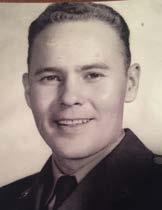

DeDee Taylor’s uncle
F – Mike Hamil, US Air Force
Vietnam Veteran 1967-1971




G – Jake Brown – Future Marine

To be commissioned May 13th as Second Lieutenant Tim Brown’s son





H – Sergeant Kirkland S. Gri n, USAF National Guard

Charlotte Gri n’s son
I – John W. Sullivan, US Army Cindy Kahn’s father






J – PFC Paul D. Comans, US Army
Killed in action in World War II



Charlotte Gri n’s uncle
K – MSG Stacey Reeves, US Army

Retiring June 30, 2023, with 31 years of service.

Pictured with wife, Lynn Reeves
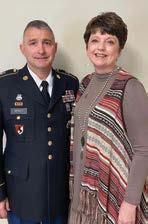
L – Roe Neves, US Air Force
Served 20 years
Candace Keen’s grandfather
M – Sergeant Major Jonathan D. White, US National Guard
Pictured with his wife Heather, and children, Ava and Andrew

N – PFC Raymond Comans, US Air Force

Served during Korean War Charlotte Gri n’s father



May is National Electrical Safety Month, but electrical safety is something we all need to practice in our homes daily. Follow these simple steps to help prevent electrical accidents and fires. According to the Electrical Safety Foundation International, an estimated 35,000 home fires, over 1,130 injuries, 500 deaths and $1.4 billion in property damage occurs each year because of electrical malfunctions.
DO keep electrical devices away from water to prevent electric shock.






place flammable items, like potholders, napkins or dish towels near the stove while cooking.
overload electrical outlets with more devices than the circuit can handle.
DO ensure you’re using the correct wattage in all light fixtures.





Following these suggestions, you and your family will find it easy to avoid electrical fires, fatalities, injuries and damage. Contact Southwest Electric for additional safety tips at 800-287-8564 or visit our website at southwestelectric.coop.

Vell joined the Southwest Electric family in October 2010 as a Substation Technician. In 2012, he was transferred to work in the Meter Shop. He became a Staking Technician in 2014 and returned to the Meter Shop in 2017. Vell ensures that our meters are calibrated correctly before installation at a home or business. He tests meters on a regular basis and maintains our inventory. Vell and his wife, Roysheda, live in Brookhaven and have three children.





















Dee became an employee of Southwest Electric in October 2010 as a Member Services




Representative. She is one of the voices



Members hear when they call the o ce. Dee helps Members with entering service orders for new security lights, understanding their usage and bills, answering questions about our programs and explaining forms for billing and payment options. Dee lives in Port Gibson and has two children.
To all of the mothers in our communities,
SUNDAY, MAY 14






To ensure that every Mississippian is prepared for any type of disaster, whether natural or man-made, we must be prepared. Preparedness begins with individuals and families, but a key component is for communities to come together and help one another prepare. Every family should have a fully-stocked disaster supply kit and a home evacuation plan. If disaster strikes in your area, where would you go? What would you do? Who would you contact to let everyone know that you and your family are safe?
FIRST:
Stock your disaster kit with:
Flashlight(s) with extra batteries
Portable radio with extra batteries
NOAA Weather Radio
Non-perishable food for at least 3 days
Bottled water (1 gallon per person per day)
First aid kit with prescription medications
Bedding and clothing for each family member
Blankets and towels
Plastic dishes/utensils
Rain jackets/pants
Sunscreen/sunglasses/mosquito repellent
Baby supplies (food, diapers, medication)
Pet supplies (food, leash, carrier, vaccination records)
Sanitary supplies
Toothbrush, toothpaste, soap, shampoo, cleanser, bleach, towelettes, toilet paper, trash bags and feminine hygiene products
Copies of important documents
Driver’s license, SS card, proof of residence, insurance policies, wills, deeds, birth and marriage certificates, tax records, medical records, family pictures, etc.
Cash (enough to fill up your vehicle with gas)
Emergency generator
Develop a home evacuation plan. If a disaster happens near your home, know where you and your family would go, what you and your family would do, and how you and your family would do it. If your home is damaged, know where everyone would go. Every family member should know the plan and how to execute the plan. Also, have a contact person outside of the area of your home to let them know everyone is safe.
LAST:
Practice. Set time aside to practice the plan with everyone in the home. Everyone should know what to do and where to go in the event of an emergency. It can also be helpful to plan for disasters with your neighbors, family and friends. Sharing your emergency plan with neighbors, family and friends can help everyone know your specific plan and assist with recovery from the disaster.
The National Weather Service issues alerts for severe weather like a tornado, thunderstorm or hurricane. Do you know the difference between a watch and a warning? You can compare a tornado to a taco. Think of a watch as all the ingredients to make a taco and a warning as the taco.

WATCH: We have the ingredients to make tacos.
WARNING: We’re having tacos. RIGHT NOW!

Twin County Electric will soon begin an Advanced Metering Infrastructure (AMI) project and will be replacing all of our members’ residential meters. The new residential meters will utilize a built-in module that will collect and report data to a central command center.
Twin County Electric’s goal is to fully deploy the AMI system by the end of 2023. The project will begin in June, in the Eagle Lake area, where meters will be replaced. Crews from Allegiant Utility Systems (a meter service contractor) will be systemically changing out electric meters in that area and the rest of the Twin County Electric service area until all electric meters in Twin County’s system have been replaced.
Crews from Allegiant Utility Systems will drive trucks with a Twin County Electric logo on their doors and will provide employees with a picture ID badge to verify their identity.
“This AMI project will enable Twin County Electric to read consumers’ meters remotely. Each day, the meter will send a stream of data over the power line that will include the meter reading, the voltage, and other information about the consumer’s electric usage and power quality of the service,” said Tim Perkins, Twin County’s general manager.
The information collected will allow Twin County Electric to manage its facilities more e ectively and will provide valuable



data to use in detecting outages more promptly, in planning for system maintenance, improvements, and growth, and will a ord other benefits in serving members, Perkins added.





The AMI system will utilize Aclara RF devices. Aclara RF is a two-way advanced metering system that o ers the association the ability to communicate bi-directionally with the meter which will provide even more future benefits as technology advances.










The technology has been in use and in constant development for many years and it provides the highest level of accuracy, reliability, and e ciency. When completed, the association will no longer send a meter reader to residences each month. AMI will help the association to manage power outages more e ciently, and will provide information to the engineering and operations departments that will enable them to design and operate a more reliable electrical system.
When the crew arrives at a consumer’s location, they will change out the electric meter and record various information about the location. Because the meter is being changed out, power will be momentarily interrupted. They will leave a notice that they changed the meter if the consumer is not at home.

If you have any questions call us at 662-827-2262.



The March 24 tornado that ripped through the Rolling Fork and Silver City areas was devastating for many members of Twin County Electric. Some families lost their homes and/or businesses, and sadly, some lost loved ones. In addition, our Rolling Fork o ce also su ered severe damage. The phone line is operable, and we are eager to assist. In the meantime. the o ce is expected to be rebuilt in its original location.
Thank you to our partner cooperatives who arrived as early as the evening of the tornado. One of our guiding principles is “Cooperation among Cooperatives.” We can’t think of a better example of the electric cooperatives’ “power” among cooperatives in Mississippi. Thank you to Northcentral Electric Cooperative and Yazoo Valley Electric Cooperative for their dedication and help.
Lineman crews dispersed early each morning to all regions of our territory, while sta members prepared and delivered meals and drinks. The crews first concentrated on the integral backbone of the electrical system before working expeditiously and safely to replace and repair more than 400 power poles.
The Lord was definitely shinning his light on us.
Power was quickly restored to all members who could safely receive it in less than a week.
We are thankful for our talented linemen and crews, engineers, cooperative partners, and contractors who remained steadfast and resilient during this crisis to restore power to our members.


One of our guiding principles is “Cooperation among Cooperatives.” We can’t think of a better example of the electric cooperatives’ “power” among cooperatives in Mississippi.

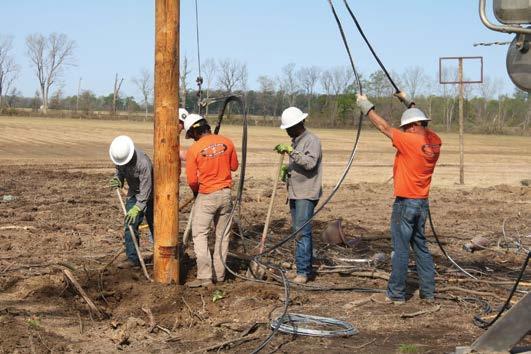
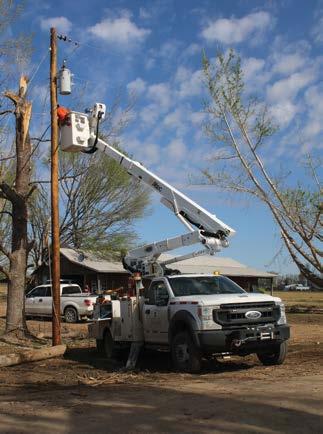
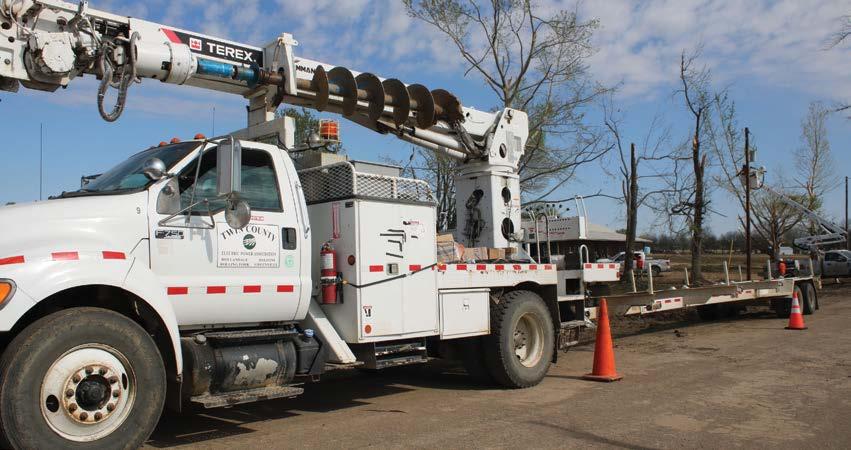
DON’T place flammable items, like potholders, napkins or dish towels near the stove while cooking.
DO ensure you’re using the correct wattage in all light fixtures.
DO keep electrical devices away from water to prevent electric shock.
DON’T overload electrical outlets with more devices than the circuit can handle.
Serving as a protector for their children comes naturally for most fathers.
Joseph Brooks suddenly found himself in that role when he and his son Brant were caught in the path of the tornado that devastated Rolling Fork on March 24.
Brooks, who manages the right-of-way maintenance department for Yazoo Valley Electric Power Association, had just enjoyed a meal and shooting pool with his son at Chuck’s Dairy Bar. They had decided to go out to eat while other members of the family were attending a high school prom in Glen Allan.

They were leaving to go back to their home in Holly Blu when the previously peaceful evening took a drastic turn.


“We were leaving and had to stop at Highway 61 because there were cars coming from both directions,” Brooks said. “I looked over near the John Deere place, and I saw a light pole arcing. Then, I noticed a pole right next to me arcing too.”


Brooks instantly realized that the power lines being destroyed meant that a severe storm was heading right in his direction.
“I grabbed my son and pulled him over my truck console,” Brooks said. “I just covered him up with my body to shield him.”



The window beside him on the driver’s side exploded and the truck was being hammered with debris.




“I heard my side of the truck window bust,” he said. “Then all the windows started busting, and things were flying through our truck. I could feel the truck lifting up.”
Brooks covered his son until the storm subsided. Their only injuries were some cuts and scratches from the glass and debris.
“There was a 2x4 and a power line under my truck when I got out so I think it’s safe to say we were lifted for a moment,” he said.

Inside the restaurant, the owners and their sta took refuge inside a walk-in cooler. That decision likely saved their lives as the building was destroyed around them.
Brooks said the first thing his son wanted to do when the storm subsided was call his mother Junae.
“It was strange because it didn’t even rain until the tornado had passed through,” Brooks said. “When we were on the phone with my wife, she suggested that we go inside Chuck’s to get out of the rain. I said, ‘baby, there ain’t no Chuck’s anymore.’”
He soon realized there wasn’t much left standing in the area. The tornado took 13 lives in Sharkey County and over 20 across the state. Over 80% of the homes in Rolling Fork were damaged or destroyed. Nearby Silver City also su ered extreme damage and the loss of three lives.
Seeing the aftermath of Friday’s tornado in the daylight really put things in perspective for Brooks.
“It’s like the whole town of Rolling Fork is gone,” he said. “I don’t really know if some of the people will come back. You just don’t know.”









All the windows started busting, and things were flying through our truck.
I could feel the truck lifting up.A scene in Rolling Fork near where Joseph Brooks and his son were. Joseph Brooks’ truck after the storm.




Yazoo Valley Electric was able to quickly repair damage to our system caused by the storms that brought destructive tornadoes to nearby Rolling Fork and Silver City. Yazoo Valley crews then went to work helping nearby Twin County Electric Power Association. Twin County had over 400 poles destroyed by the storm.
Most of Yazoo Valley’s work involved restoring lines that were wiped out in rural areas.
















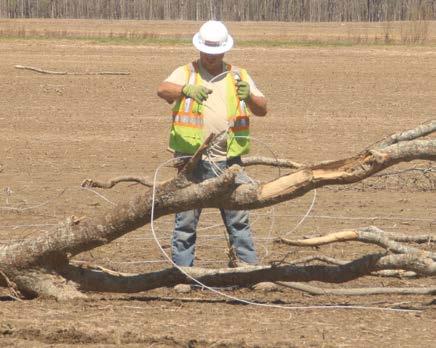





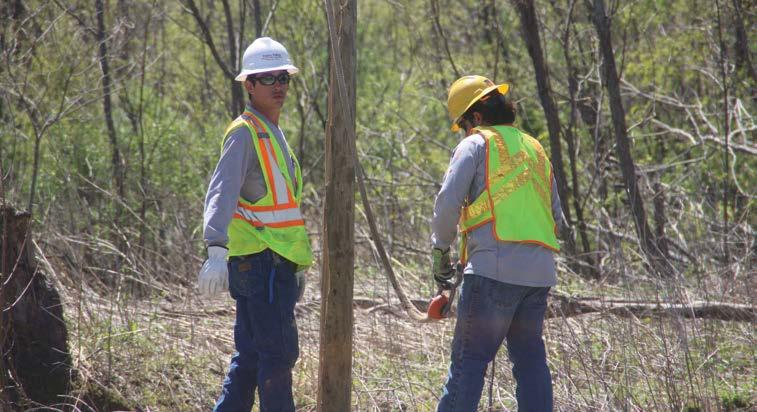












Yazoo Valley Electric Power Association congratulates Johnathon Demita for being voted our 2023 Lineman of the Year and Tanner Evilsizor for being selected as 2023 Apprentice Lineman of the Year. They were selected for these honors by their peers in recognition of their hard work and dedication to the members of Yazoo Valley Electric Power Association.


An EF-3 tornado struck parts of rural Mississippi March 24 causing historic damage that communities are still sorting through as of this writing.
The towns of Rolling Fork, Silver City, and Amory were hit hard that night. There were close to 20 lives lost, homes and businesses that were wiped out, and of course, major power outages.
Those three communities are part of the service territories of Twin County Electric and Monroe County Electric.
Once we knew bad weather was headed our way, we activated our emergency plan including rolling out our co-op mutual aid strategy.


Cooperatives around the world operate according to the same set of core principles and values, adopted by the International Co-operative Alliance. Cooperatives trace the roots of these principles to the first modern cooperative founded in Rochdale, England in 1844. These principles are a key reason that America’s electric cooperatives operate di erently from other electric utilities, putting the needs of their members first.
When disaster strikes, it’s the sixth cooperative principle that becomes key to power restoration — Cooperation Among Cooperatives.
Co-ops work together to improve services, bolster local economies, and deal more e ectively with social and community needs. They also assist each other during times of crisis.
Our cover story this month is about how co-op mutual aid is our most vital tool in safe and timely power restoration in the aftermath of disaster.
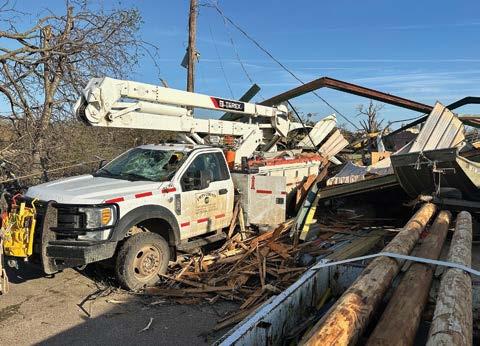
We hope you enjoy the May issue.
Mississippi to me?
It’s a thousand memories, of the beaches, and the breeze, and the lapping of the Gulf on my knobby-kid knees.

Mississippi to me?
by Michael Callahan Executive Vice President/CEO Electric Cooperatives of Mississippi






It’s family folk, now departed, on the seawall, and the harbor, catching bounty from the waters; trout and shrimp, and crab and oysters.
Mississippi to me?
It’s the place that I am known. Where my soul can freely roam, where my heart and I belong.
Mississippi is my home.
by Penny Cox Caldwell, a resident of the Hancock County coast, and a member of Coast Electric



